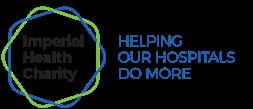
Our mission



Our mission

At Imperial Health Charity we help our hospitals do more through grants, arts, volunteering and fundraising.
For the benefit of patients and NHS staff, we fund major redevelopments, research and medical equipment at five London hospitals - Charing Cross, Hammersmith, Queen Charlotte’s & Chelsea, St Mary’s and the Western Eye - as well as helping patients and their families at times of extreme financial difficulty.
Supporting the arts in healthcare, we manage an Arts Council accredited hospital art collection and run an arts engagement programme.
We also manage volunteering across all five hospitals, adding value to the work of staff and helping to improve the hospital experience for patients.
Fundraising through major appeals and community events enables us to continue our important work.

The role played by NHS charities such as ours in supporting our health service has never been more important than it is today. We’re proud then, that over the last financial year we’ve been able to provide more support than ever before to help our hospitals do more – not only within the hospital walls, but also out in the wider communities these hospitals and their brilliant teams serve.
With your help, we have made a significant positive impact for staff and patients across our hospital sites this year. We were delighted to open our fantastic new playroom for children and young people being treated at St Mary’s, and our third refurbished staff lounge in the Queen Elizabeth the Queen Mother building.
Through our grants programme we were able to award more than £4.3m to enable a wide range of projects aiming to improve patient care and experience, drive innovation, and support the professional development and wellbeing of NHS staff. We’ve been pleased through this programme to continue supporting patients and their families in times of financial hardship, while championing innovation in treatment and care across the hospitals we support.
The far-reaching benefits of our arts programme continue to be felt not only within our hospitals, but also in the wider community, where we’ve done more than ever before to help people improve their physical and mental health and wellbeing. This year we’ve engaged almost 6,000 patients and NHS staff in our arts activities, and supported 150 young people through art and music therapy.
We can’t do any of this work alone, and our army of volunteers continue to make a huge difference to patient experience across our hospitals, clocking up nearly 30,000 hours of invaluable support in and around the five hospital sites, and interacting with more than 140,000 patients. In addition, our pioneering employability programme continues to provide an effective pathway to help people back into work, in particular in the hospitals, supporting the Trust’s role as an anchor institution.
Of course, none of this would be possible without the hard work of our fundraising teams, and the extraordinary generosity of fundraisers, donors and partners who together have helped us raise more than £5m to help our hospitals do more.
In summer 2024, we were delighted to welcome Dr Andreas Raffel as our new Chair of Trustees. In order to build on the huge achievements we’ve made under our current strategy, we have taken the decision to extend it by one year, until the end of March 2026. It is our firm belief that, in doing so, we will be able to build on the successes you will read about in this report. Extending our strategy will allow us space and time to plan our next phase of activities alongside our new Chair, to ensure we’re best placed to do even more for the staff, the patients, and the communities we’re so proud to serve.
As we look to the future, it would be remiss not to pay huge thanks to our outgoing Trustees, Deputy Chair Caroline Lien and Finance Committee Chair Kevin Bone, who stood down at the end of the year, and in particular our departing Chair of Trustees, David Crundwell, who served from 2013-2024 and helped steer the charity through a period of transformational growth.
David’s leadership, his wisdom, and his unerring dedication to the work of Imperial Health Charity over the last 11 years have been invaluable, and as we thank him for his service, we wish him, Caroline and Kevin the very best for the future.
Ian Lush OBE Chief Executive


Imperial College Healthcare is one of the largest NHS trusts in the country, with more than 15,000 staff across north west London. The Trust provides acute and specialist healthcare to over one million people a year.
With a reputation for excellence in research and education, the Trust’s five hospitals – Charing Cross, Hammersmith, Queen Charlotte’s & Chelsea, St Mary’s and the Western Eye – influence clinical practice nationally and around the world.
In addition, the Trust is developing a growing range of integrated and digital care services, and offers private healthcare in dedicated facilities at each of its hospital sites.
Together with Imperial College London, The Institute of Cancer Research, London, Chelsea and Westminster Hospital NHS Foundation Trust and The Royal Marsden NHS Foundation Trust, it forms the Imperial College Academic Health Science Centre – one of eight academic health science centres in England. This close working partnership ensures that cutting-edge research can be translated quickly into better patient care and excellence in education.
The Trust is also a major provider of education and training for doctors, nurses, midwives and allied health professionals, including therapists, pharmacists, radiographers and healthcare scientists.


patient contacts (including inpatients, outpatients and day cases)







emergency attendees (including A&E and ambulatory emergency care)
babies born in the Trust's maternity departments
1.37m 298,000 9,500 33,400
operations performed at the Trust's hospitals
96%
positive overall rating of care for inpatients
clinical research studies in progress
capital investments, including buildings, infrastructure and IT
1,010 £98.3m 15,699
staff employed by the Trust
The Trust’s five hospitals specialise in a number of different areas:
Charing Cross Hospital provides a range of acute and specialist services, including cancer care and a 24/7 accident and emergency department. It also hosts the hyper-acute stroke unit and is an important hub for integrated care in partnership with local GPs and community providers.
Hammersmith Hospital is a specialist hospital renowned for its strong research connections. It offers a range of services, including renal, haematology, cancer and cardiology care, and provides a specialist heart attack centre. As well as being a major base for Imperial College London, the site also hosts Medical Research Council London's Institute of Medical Sciences.
Queen Charlotte’s & Chelsea Hospital is a maternity, women’s and neonatal care hospital, also with strong research links. It has a midwife-led birth centre as well as specialist services for complex pregnancies, fetal and neonatal care.
St Mary’s Hospital is the major acute hospital for north west London as well as a maternity centre with consultant and midwife-led services. It provides care across a wide range of specialties and runs one of four major trauma centres in London in addition to its 24/7 A&E department.
The Western Eye Hospital is a specialist eye hospital with an A&E department and outpatients, inpatients, day case and inpatient surgery services.
The Trust’s mission is to serve as a key partner in our local health system, drive innovation in healthcare and deliver outstanding care, education and research with local, national and global impact.
As the Trust’s dedicated charity, our role is to support and enhance this important work for the benefit of patients and NHS staff.
What we do
As the dedicated charity for Imperial College Healthcare NHS Trust, we help our hospitals do more through grants, arts, volunteering and fundraising. Our activities support hard-working hospital staff while improving the care that patients receive – above and beyond what the Trust can achieve with NHS funding alone. We deliver supportive programmes that enhance the overall hospital experience for staff and patients as well as awarding funding for healthcare projects that enable the Trust to provide an even better service.
Through our grants programmes, we fund a range of projects and initiatives to help improve patient care and hospital experience, support the wellbeing and professional development of NHS staff and enable innovation across the Trust’s five hospitals and its wider communities.
We fund major refurbishments to hospital buildings and facilities, invest in pioneering new research and provide additional medical equipment as well as helping patients and their families at times of unexpected financial difficulty.
Our support goes above and beyond what the NHS can achieve on its own, helping our hospitals provide outstanding care 24 hours a day, 365 days a year.
£4.36m
We believe that art and creativity are key to our health and wellbeing, and can enhance the hospital experience for patients, family members and other visitors as well as contributing to a better working environment for NHS staff.
Through a comprehensive arts engagement programme and an Arts Council accredited collection of more than 2,500 artworks, we help to brighten hospital hallways, wards and waiting areas, and deliver a broad range of uplifting creative activities.
2,500+
artworks in our museum accredited collection
Throughout the year we organise installations, run exhibitions and deliver arts engagement activities for patients as well as offering hospital staff free access to exhibitions and performances through our Staff Arts Club.
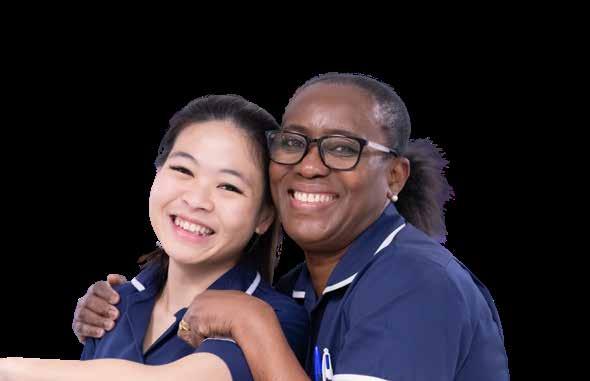
of NHS staff say the charity makes their hospital a better place to work 97%
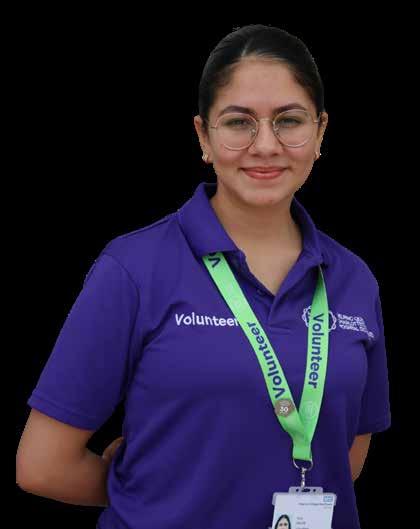
Caption Volunteering
149,800
patient interactions recorded by our volunteers
Caption
Volunteers play an essential role in helping our hospitals do more for patients and their loved ones.
Pointing visitors in the right direction, assisting NHS staff or simply offering an ear to listen, volunteers are a helping hand to everyone who passes through our hospitals.
Since taking over the management of volunteering at our hospitals in 2016, we’ve significantly increased volunteer numbers, created a range of dynamic new roles and developed our infrastructure to provide a high-quality experience for our volunteers and the NHS staff they work with.
In recognition of our high standards of volunteer management, we were awarded the highly regarded 'Investing in Volunteers' status in 2022 and were recognised for our Covid-19 response in the Mayor of London’s Volunteering Awards in 2020.
Our fundraising activities enable us to continue helping our hospitals do more and we are indebted to our many supporters for their generosity and goodwill.
We generate our fundraised income through an increasingly diverse range of activities, including legacies, philanthropy, community events, corporate partnerships and individual giving.
To ensure all our fundraising activities conform to nationally recognised standards, we're registered with the Fundraising Regulator and follow its code of practice.
Fundraising of event fundraisers would recommend doing an event to a friend 92%

Our current strategy
In order to build on the huge achievements we’ve made under our current strategy, we have taken the decision to extend it by one year, until the end of March 2026.
Extending our strategy will allow us to build on our successes to date, and give us space and time to plan our next strategy alongside our new Chair of Trustees.
Building on the foundations of our recent successes - improving hospital care and experience for patients, enhancing NHS staff wellbeing and driving forward research and innovation - this strategy is about expanding and enhancing what we do, exploring ways in which we can work with Imperial College Healthcare to support better health outcomes in our surrounding communities as well as within the hospital walls.
In developing our strategy, we have reflected on our knowledge, experience and expertise across the organisation, seeking to build upon our existing strengths to focus on areas of activity where we believe we can make a significant impact.
Our vision, mission and objectives
Our vision is exceptional care and better health, within our hospitals and in our communities, above and beyond what the NHS alone can provide.
Our mission is to work together with Imperial College Healthcare and other partners to enhance the experience of care throughout the patient journey, acting as a catalyst to support better health outcomes in our hospitals and in the wider community.
Our strategic objectives are:
1. Enhance patient experience throughout the care and treatment journey
Every patient deserves the best possible experience during their time in hospital - from the moment they arrive until they’re ready to
return home. Through this strategy, we are continuing to put patients at the heart of everything we do, working with our NHS colleagues to deliver key programmes and services that will help to provide an exceptional patient experience at every stage of the treatment journey.
2. Expand Imperial College Healthcare's capacity to provide outstanding care and improve health outcomes
By driving forward pioneering research and investing in innovation, we are helping to accelerate improvements in care across our hospitals. At the same time we are recognising the enormous contribution made by our extraordinary NHS staff, supporting their wellbeing and professional development while improving hospital facilities to create better working environments.
3. Support better health and wellbeing for patients in our surrounding communities
We understand that patient care is no longer confined to the hospital walls. That's why we are working in partnership with Imperial College Healthcare to identify ways in which we can make a significant positive impact by seeking to address wider health inequalities, while adopting a test-and-learn approach to explore how we can deliver programmes and services effectively in community healthcare settings.
While continuing to deliver many of our existing activities, we want to expand our work to ensure we make an even greater impact. We have identified four key action ‘pillars’, which will help us organise our additional activities during the period of this strategy. Each of these pillars represents an area of activity where we believe we can make a significant positive impact on top of our existing work, playing to our strengths and building on what we have already achieved.

Exceptional care and better health, within our hospitals and in our communuties, above and beyond what the NHS alone can provide.



Objective 1
Enhance patient experience throughout the care and treatment journey
Objective 2
Expand the Trust's capacity to provide outstanding care and improve health outcomes
Objective 3
Support health and wellbeing for patients in our surrounding communities
Providing better patient care will be at the heart of everything we do. On top of our existing activities, we are developing new ways of working that enable us to be more agile and reactive to the hospitals' operational demands. We are redesigning our small grants programme to focus exclusively on patient care improvements, trialling a fast-response volunteering scheme within the hospitals and seeking to provide arts activities in the community.
Health inequalities persist in our local communities. To help address these deeply rooted problems, we are enhancing the role of Imperial College Healthcare as an anchor institution and playing our part in improving health and wellbeing. We are offering careerenhancing experiences by convening pathways into volunteering and employment across the hospitals, and expanding our arts programme to trial community-based arts and leisure activities, as well as continuing the evaluation of Compassionate Communities to inform the development of further place-based and health inequalities work.




Patient care
Drive forward improvements to patient care - in our hospitals and communities
Population health
Enhance the Trust's role as an anchor institution by addressing health inequalities
Service transformation
Enable transformative innovation projects aligned with the Trust's priorities
NHS staff wellbeing
Support the mental health, morale and general wellbeing of NHS staff
Creating the right conditions for innovation is key to improving patient care. Building on the success of our Innovate at Imperial funding programme, we are developing further opportunities to support NHS teams in transforming the way their services are delivered. We are evaluating Innovate at Imperial to target greater long-term impact, and exploring where capital funding can support innovative or transformative projects.
Burnout, exhaustion and low morale among staff remain significant challenges for the NHS. With this strategy, we are continuing to provide additional support that will help create better working conditions for hospital staff. We are working with Imperial College Healthcare to build upon existing activities designed to boost morale and enhance wellbeing, expand the benefits available through the existing staff recognition scheme and support further improvements to staff spaces and facilities.


Thanks to the extraordinary generosity and goodwill of our many supporters, our fundraising activities have enabled us to continue helping our hospitals do more over the past year.
In 2023/24 we exceeded our budget for fundraised income, raising £5.5m in total. Our total fundraised income for the year comprised:
• £2.0m from philanthropic donations
• £2.0m from legacies
£648k from grants received
• £492k from community fundraising activities and events
• £303k from corporate donations.
In 2023/24 a significant proportion of our fundraised income was generated through philanthropic and legacy gifts. A smaller share of our income was drawn from corporates, community fundraising events and grantsmainly for research - received from the health sector and higher education institutions.
• Philanthropy and corporate
Philanthropic fundraising continues to be an important source of our income. In many cases, this has been driven by grateful patients who would like to support our work after receiving outstanding care at the hospitals. During the year we continued to proactively engage with consultants in leadership roles at Imperial College Healthcare NHS Trust, which has enabled them to connect us with patients who have had a positive experience of care and are interested in making a gift. We have also expanded our promotional activities to improve our visibility across the hospital sites.
Our Time for Play appeal, supporting the construction of a new play and therapy space
for children at St Mary’s Hospital, closed at the end of 2022/23. Construction was completed in 2023/24, with a special event to formally open the space in May 2024, hosted by comedian Mo Gilligan and attended by our generous supporters.
We also successfully completed our campaign to raise funds for three new pieces of equipment for extracorporeal membrane oxygenation (ECMO) for Hammersmith Hospital’s critical care unit. In June 2023, we officially opened the Sanctuary Garden at Charing Cross Hospital, providing a peaceful space for those facing a bereavement or needing a quiet moment away from the wards. These projects were made possible thanks to the generosity of our donors.
In addition, our partnership with The Parasol Foundation continued throughout the year. Established in March 2022 with a pledge of £2.25m, The Parasol Foundation Centre for Women's Health and Cancer Research is focused on developing advanced treatments for women's cancers and helping us better understand the health impacts of pre-term birth. During 2023/24, The Parasol Foundation generously increased their pledge by £430k to support further research into the links between infectious diseases and pregnancy.
• Cross-team working & collaboration
We have continued to identify opportunities to raise funds towards our arts programmeand received generous donations during the year to support our art and music therapy activities in children's services at St Mary's Hospital, along with support for our wider arts programme for patients.
We have continued running a promotional campaign around legacy giving. In addition, we promoted our Free Will Service to supporters and to NHS staff at our hospitals, which has led to an increase in use of the service. In 2024 we were delighted that our legacy campaign was shortlisted for the Smee & Ford Legacy Awards.
The administration of bequests at the charity is supported by the agency Legacy Link. Over the course of the year, we received 25 gifts in wills, including an exceptional gift of £1.3 million for oncology. Gifts are often linked to an individual's previous experience of excellent patient care, and we were fortunate to receive bequests supporting several hospital services, including critical care, IVF services, orthopaedics, and many other medical specialties along with general gifts to our hospital sites. We are grateful to all our legacy donors and pledgers who have chosen to remember us - and our hospitals - in their will.
Thanking and acknowledgement
We are reliant on the support of our many donors and fundraisers to continue our charitable work and we are extremely grateful to each and every one of them for their generosity and goodwill. Whenever possible, we have organised hospital tours and small events to engage and thank our donors for their support.

Our grants programme provides funding for a range of projects and initiatives to enhance patient care and experience, support the wellbeing and professional development of NHS staff and enable innovation to improve health outcomes. In total, we awarded £4.36m during 2023/24.
Our Innovate at Imperial programme provides funding to help NHS staff develop new ideas for improving care.
The programme has proved extremely popular with NHS staff and we were able to award a total of £329,000 to support innovation projects during the year, including initiatives that strengthen hospital processes, improve safety and support the health and wellbeing of staff.
Notable projects that benefited from funding included: the co-design and evaluation of a hand therapist delivered fracture clinic; an innovative approach to the management and prevention of domestic abuse in A&E; the development of an oral systemic anti-cancer treatment service in breast cancer; and a new approach to improving health and wellbeing for people with high-impact chronic musculoskeletal pain.
Our Research Fellowships programme provides opportunities for health professionals to take time away from their current role to pursue a research project. We provide fellowships of up to £85,000 which may be used to support an individual’s salary and related research expenses during their project.
Run jointly with the National Institute for Health and Care Research (NIHR)Imperial Biomedical Research Centre, the programme provides a platform for NHS staff to progress their clinical academic careers through further study. During the year, six fellowships were awarded with a total commitment of £547,000.
We award emergency hardship grants to support patients and their family members experiencing extreme financial difficulty as a direct result of their time in hospital. Grants of up to £1,500 are awarded to help patients and their families cover everyday costs, such as travel, accommodation, food and other essentials. These grants may also be used to help bereaved families cover funeral costs up to £1,100.
During the year we saw a continued increase in demand for emergency hardship support, largely due to the increase in the cost of living. A total of 121 patient hardship grants were awarded in 2023/24, totalling £62,000. 99% of these grants included expenditure on travel costs with 97% including food costs, 44% including other essential items, 7% including hotel accommodation and 6% including funeral costs.
As part of the development of our long-term organisational strategy (2022-26), we have reviewed the impact of our previous small grants programme. Following this review, we developed plans to focus the programme towards supporting small-scale improvements to patient care and experience.
These grants provide funding to help NHS staff implement small-scale projects designed to improve patient care and experience at our hospitals. In 2023/24, we awarded grants of up to £10,000 to eight individual projects, spending £49,000 in total.
Innovate at Imperial
£258k
Trusteecontrolled special purpose funds
£1.87m
New strategic initiatives
£515k
£1.22m
Research Fellowships
£437k
Funding awarded, 2023/24. Total: £4.36m
To ensure we allocate charitable funds in line with the preferences of our donors, we also oversee a number of special purpose funds. These restricted funds, reserved for specific areas of clinical specialty, enable us to contribute to a wide range of healthcare projects and staff wellbeing initiatives supporting a series of wards, departments and services across the Trust’s hospitals.

Fund advisor special purpose funds are often used to fund small-scale initiatives and research projects. Among the largest and most significant of these funds are Poppy’s Fund, which supports maternity services at Queen Charlotte’s & Chelsea and St Mary’s hospitals, and The Blood Fund, which supports clinical research at Hammersmith Hospital’s haematology department.
Our larger restricted donations are placed in ‘trustee-controlled’ special purpose funds, which allow our trustees greater oversight of funding towards specific grant awards in accordance with donors’ wishes and our broader strategic aims. Other smaller restricted donations are placed in ‘fund advisor’ special purpose funds, which enable NHS staff to direct funds within their area of specialty under delegated authority.
During the year we continued an ongoing programme of work to improve the efficiency of special purpose fund management. This has involved efforts to engage and support individual fund advisors, with a focus on improving financial reporting, accelerating the expenditure of funds towards relevant projects and maximising fundraising activities.
In 2023/24, we awarded £1.87m through trustee-controlled special purpose funds and £1.22m through fund advisor special purpose funds.
With a comprehensive arts engagement programme and a museum-accredited collection of more than 2,500 artworks, we work to enhance the hospital experience and clinical environment for patients and NHS staff. Through our arts programme we install permanent displays, organise exhibitions, stage events and run creative workshops within our hospitals, as well as providing activities for families, visitors and the wider community.
Through our curatorial programme of commissions and installations, 157 new artworks were acquired and 234 were permanently displayed across our five hospitals for the enjoyment of staff, visitors and patients. Acquisitions included some significant donations by Tom Hammick, Sue Arrowsmith and Anthony Lysycia totalling gifts of over £25,000. Notable installations included a large commission by Sumuyya Khader for the ground floor corridors at Charing Cross Hospital, a stunning set of site specific prints
Following on from the success of the Children’s Style Guidelines, we were delighted to create similar guides for the Side Rooms project which is connected to our work around palliative care.
In a survey carried out in July 2023, 94% of NHS staff at Imperial College Healthcare agreed that the artwork on display made their hospital a better place to work.
Through our Art in Focus programme, we displayed three new exhibitions over the course of the year in our temporary exhibition spaces at Charing Cross, Hammersmith and St Mary's hospitals.
These included a joint exhibition with artists Susan Thompson and Sara Choudhrey from Kindred Studios - one of our community partners - and a display of artworks made by patients who attend our monthly Art & Wellbeing group. .

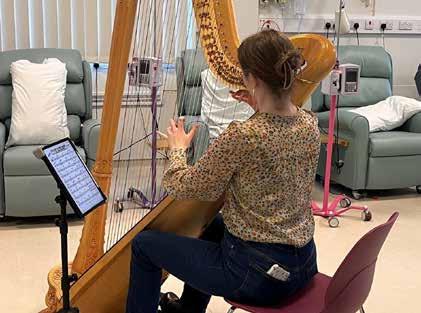

157
artworks acquired for our museumaccredited hospital art collection

234
new artworks permanently installed in hallways, wards and waiting areas

Beyond Our Walls: Community Arts Engagement Programme
As part of the charity’s current strategy to support the communities around our hospitals, this year saw the launch of ‘Beyond Our Walls’. The programme aims to support patients at the point of discharge, patients living with chronic conditions and members of the public at risk of becoming patients.
Significant projects this year include:
‘Gallery Club’, which works in partnership with the Stroke and Neurorehabilitation Units to enable recently discharged patients to attend museums and galleries in London within a supported group.
‘Changing Perspectives’, which works with patients referred from the Pain Management team to use photography to enhance their wellbeing, mental health, and enable social connections.
Creative Acts: Hospital Based Arts Engagement Programme



patients and members of NHS staff engaged in arts activities
671
participatory creative arts workshops held for patients and NHS staff
834
art therapy and music therapy sessions held for patients
150 5,934
individual young people supported with art therapy and music therapy
Our core programme supports patients and staff with creative activities across our five hospitals. Facilitated by artists, art therapists and our own in-house team, our engagement programme has grown this year to support more clinical areas such as Oncology and Cardiology while maintaining a varied programme throughout Elderly Care, Dialysis, Paediatrics and the Stroke Unit. Activities include music, dance, poetry and visual arts workshops.
This year we have been proud to further expand the range of roles to support our hospitals and patients as part of our volunteering programme. During 2023/24 we reintroduced our breastfeeding support volunteers at Queen Charlotte’s and Chelsea Hospital, and expanded this vital and valued service to new parents at St Mary’s Hospital. Through our Summer Youth Programme, our Youth Volunteering Programme launched its first offer across Charing Cross, Hammersmith and St Mary’s Hospitals.
Our volunteering programme continues to grow year-on-year, and in 2023/24 the number of dedicated volunteers supporting our work across our hospitals reached a massive 936, who together contributed more than 30,000 hours across 87 clinical teams and services. As well as improving the experience of pateints and staff, our volunteers tell us they have a good experience while doing so, with an average volunteer shift rating of 4.6 out of five.
This year we were also able to host our first ever corporate volunteering day in partnership with the fundraising team, hosting a bulbplanting event at Charing Cross Hospital. This event, designed to transform the entrance of Charing Cross Hospital, was attended by more than two dozen volunteers from our generous partners, with representatives from Tishman Speyer, BNP Paribas, Vodafone and others giving their time to plant more than 9,000 daffodil bulbs.
We’ve also seen our Employability Programme – which supports people from the local area into employment within the NHS (see case study on page 21) – go from strength to strength. During 2023/24, almost half of participants in the programme were in paid employment within the NHS as a result of the skills and confidence they’d gained working with us. We look forward to building on this success in 2024/25 and beyond.

936
volunteers who gave their time to help our hospitals in 2023/24





31,837
hours contributed by volunteers in 2023/24
11,021
shifts completed by our volunteers in 2023/24
149,800
patient interactions recorded by our volunteers in 2023/24
4.6/5
average shift rating submitted by our volunteers in 2023/24
87
teams and services supported by volunteers in 2023/24
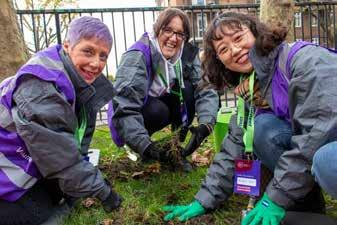
ABOVE: Our corporate volunteers at work
We've welcomed dozens of volunteers onto our new Employability Programme, which is designed to help people from central and northwest London progress into roles in the NHS. The 10week programme supports people to overcome barriers to work or education by gaining valuable experience through hospital volunteering and support with confidence building, CV writing, job applications and interview skills.
Sherina was one of the first people to take part in the programme. Here, she shares her story.
Before I started the programme, my family and I had just moved to the area and were starting from nothing. We had lived in temporary accommodation for a long time and abruptly moved to permanent housing. The house was empty when we arrived –there was no furniture, a bare floor with no carpet, and no cooker, fridge or microwave.
I applied for Universal Credit and with my first payment I managed to buy a bed for my girls so they wouldn’t have to sleep on the floor. I also bought a small microwave to use for cooking. It was a very difficult time, and there were days when I didn’t know where the next meal would come from. I didn’t know who I was as a mother, and I didn’t know what to do. I felt like I had lost hope, and I was worried about finding work and how to manage this with my kids.
One day I had an appointment at St Mary’s Hospital. As I was walking along Praed Street, I saw a banner promoting volunteering opportunities and I took a picture of it. I said to myself, I need to come out of the house – even if it’s just to volunteer. So I went to the Imperial Health Charity website and completed the online form. My family has a personal connection to the hospital. The emergency team saved my son’s eyesight in 2019 after he was attacked by a gang on his way home from school. I got the call that he was being taken to St Mary’s and when I got there I found that the lower and upper sockets of his left eye were shattered. He was treated
by the emergency team at St Mary’s, then transferred to the Western Eye Hospital and Northwick Park Hospital to receive further treatment.
When I came back to the hospital to volunteer last year, I didn’t think I would come out with a job. I mentioned that I had experience in social care and the charity team suggested I join the Employability Programme. I really appreciated the help. All the training I attended and the other volunteers I met were so helpful. They guided me through job roles and gave me the confidence I needed to apply. Now I’m really proud to be working as a Healthcare Assistant at St Mary’s.
Life is better now. Before, I didn’t know where to start. Now I work, I can pay my rent and buy my family food. Through my first few paychecks, I’ve bought a fridge and found someone to do the flooring. They did the girls’ room first and laid tiles in the bathroom. More recently they’ve laid flooring in the living room and my son’s room. I’ve also managed to buy my son a mattress and myself a folding bed, so we don’t have to sleep on the floor. There are lots of opportunities to learn and develop in the NHS.
I’ve now finished my Care Certificate and I’m waiting to do my functional skills. I’ve also spoken to the team who have said they’ll connect me with an educator to support my development. I really like my job too. It keeps me on the go and, at the end of the day, I feel like I’ve come to work and helped make someone happy. Taking part in the programme has put a smile on my face again. I would encourage anyone in my position to apply. It gives you all the opportunities you need to succeed. I encouraged my son to join the programme and he will be taking part this spring.
Of participants say the volunteering programme has improved confidence in applying for jobs 94%
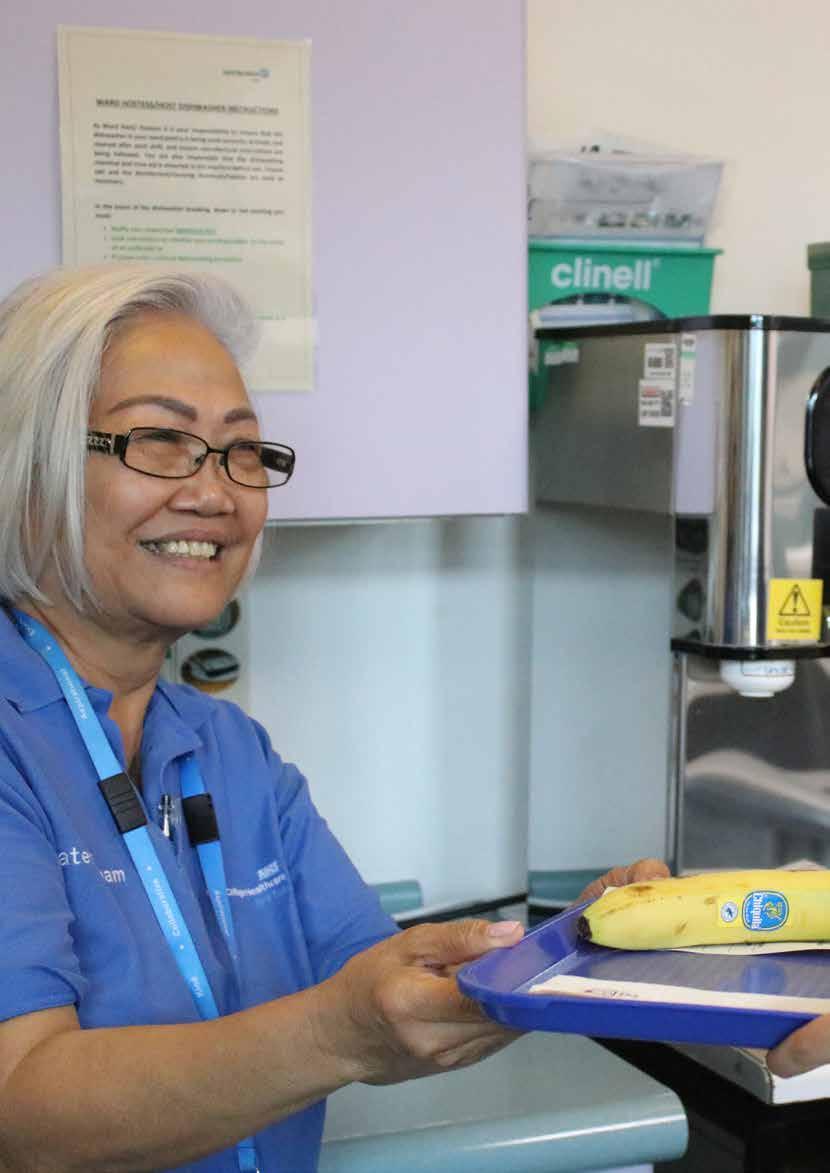
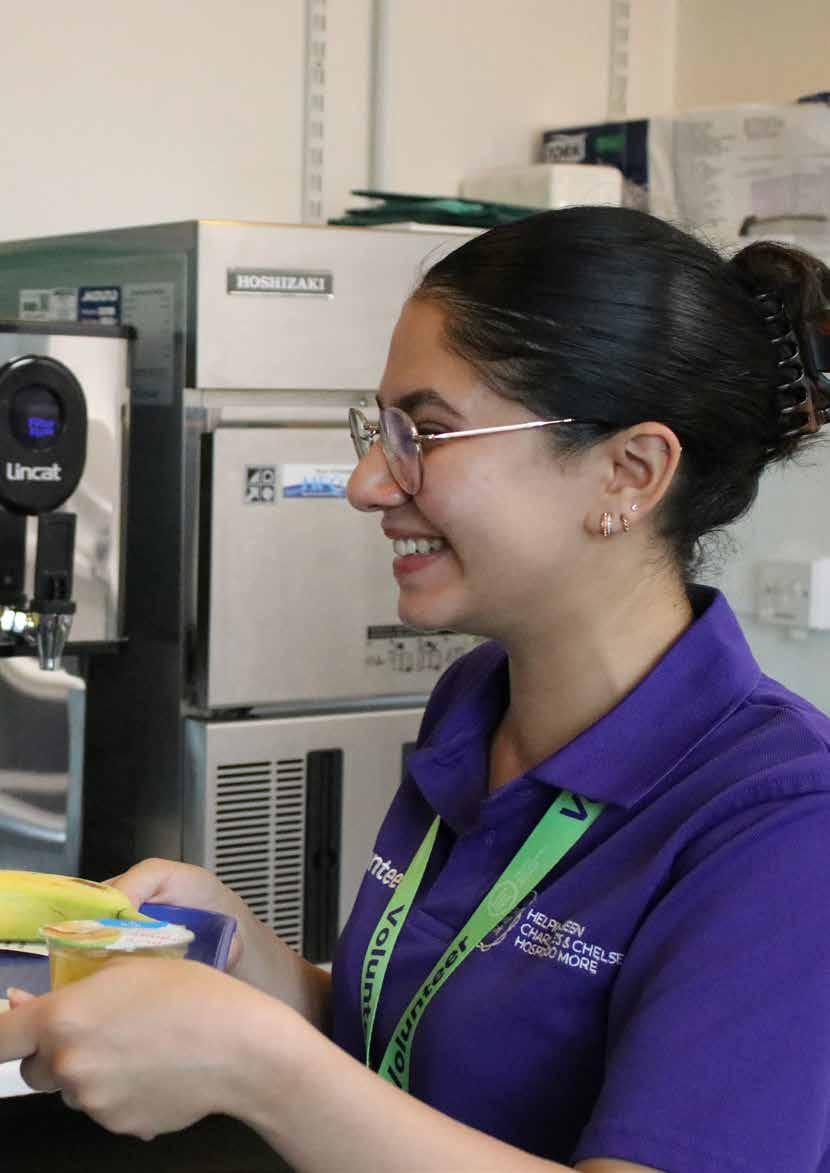
We believe that every patient deserves the best possible hospital experience. That’s why we put patients at the heart of everything we do, across every area of our work.
Through our grants, arts and volunteering activities, we strive to help our hospitals provide outstanding care for patients and their families.
Whether supporting a major redevelopment, offering creative arts activities for inpatients or enabling volunteers to help visitors find their way, our work makes sure patients feel supported and that their time in hospital is as positive and beneficial as it can be.
During the year we have continued to work in partnership with staff at Imperial College Healthcare NHS Trust to deliver key programmes and services that help to provide a truly exceptional patient experience at every stage of the treatment journey.
On top of our grants, arts and volunteering programmes, we have developed new ways of working that will enable us to be more agile and reactive to the Trust's operational demands. As part of this, we have redesigned our small grants programme to focus exclusively on funding improvements to patient care.
Highlights during the year included over 800 grants, worth over £3.2m, made from our special purpose funds to make possible initiatives proposed by staff and funded by our generous donors. These range from £1m to purchase a Focused Ultrasound Transducer that increases concentrations of chemotherapy when treating brain tumours, to improvements to staff, ward and play spaces, and support for staff training to enhance their skills.
We continued to invest in wellbeing for both staff and patients, opening ‘rest nests’ across our hospital sites for staff to relax during their breaks, and supporting the Holistic Patient Care and Wellbeing Drop-In Service through our Compassionate Communities programme to help patients waiting for surgery to improve both their physical and mental health.
This year we awarded a grant of over £75,000 to allow patients to receive hospital-level care from the comfort of their own homes. The project allows for a ‘virtual ward’ where patients can input simple data such as weight, heart rate, and blood pressure into their smartphones, which is sent straight to a medical team at their hospital.
The project targets health inequalities and improves the standard of care for those who are most vulnerable. With some patients having to spend upwards of £16 on hospital parking for an appointment, being able to log these metrics from at home and to receive notifications about abnormalities that may require an in-person visit has been life-changing.
This new home-led care can be used for a variety of patients, with the PATCH programme looking at children especially. Babies that would normally need to go into a postnatal ward can now receive care at home, taking the pressure off family life in the early days. It has been recorded that 90 babies have stayed out of A&E due to the new app.
Now the first six months of the project has been completed, we are pleased to see a 99.9% reduction in plastic waste due to reduced need for singleuse medical items, and 33% reduction in CO2 emissions as well as an overall improvement in patient feedback.

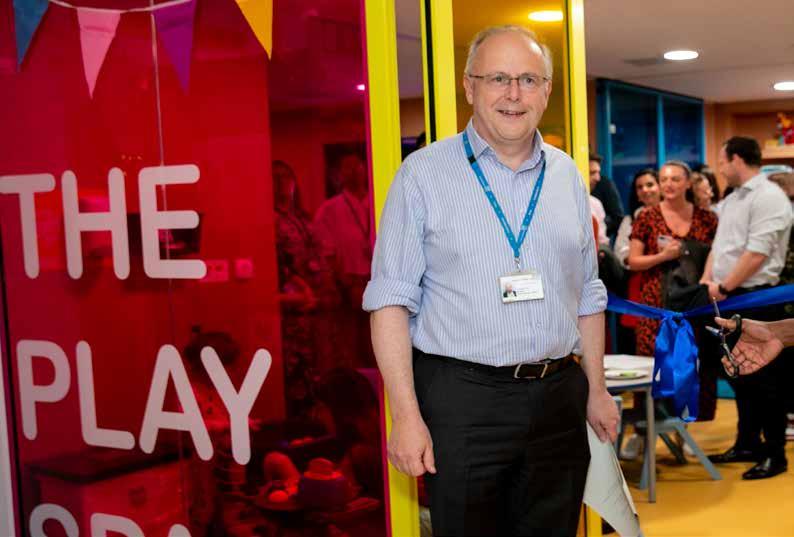
In 2021 we embarked on a mission with the Children’s Services team to give the playroom on one of St Mary’s children’s wards a muchneeded makeover. The space was no longer fit for purpose and didn’t serve the growing number of patients who required a nonclinical room to relax, play and learn in during their stay in hospital.
Thanks to the incredible support of our donors and the local community, we raised a tremendous £251,000 and have transformed the space into a bright and modern havenmeeting the needs of everyone who uses it.
To mark the official opening of the new Playroom back in May we welcomed Comedian and TV Presenter, Mo Gilligan along with Professor Tim Orchard, Chief Executive of Imperial College Healthcare NHS Trust. We also hosted 30 generous donors who made the updated space a reality.
Our Chief Executive, Ian Lush OBE said: “The new space not only brings joy and excitement to our Children’s Services, but also provides a private sanctuary for physiotherapy to take place with those bravely facing the challenges of their conditions in hospital.
ABOVE: Imperial College NHS Healthcare Trust CEO Professor Tim Orchard opening the new playroom.
of staff agree the playroom improves the hospital experience for young people 92%
transformative power of play to heal and uplift countless lives."
The new playroom is located on the Great Western Ward, 7th floor at St Mary's Hospital.

Our three-way partnership with the Chelsea Foundation, and Imperial College NHS Healthcare Trust launched in 2023.
Focusing on staying healthy outside of a hospital setting, the partnership is focused on Trust staff, patients and the wider community.
‘Bridging the Blues’, the patient-focused part of the programme, has this year engaged 110 patients, resulting in a 90% improvement in physical outcome measures. So far, the partnership has worked with patients in stroke, pulmonary, cardiac, and cancer rehabilitation.
The partnership has also seen 260 Imperial Healthcare NHS Trust staff participate in Chelsea Foundation football sessions, improving health and wellbeing across all hospital sites.
On the front line of our hospitals are the extraordinary NHS staff who provide outstanding care to patients and their families – morning, noon and night. We believe that by supporting the wellbeing of our NHS colleagues and creating opportunities to further their professional development, we can expand the Trust's capacity to provide exceptional care and better health outcomes for our patients.
During the year we have made significant efforts to improve hospital facilities across the Trust, creating better working environments for our NHS colleagues. We have also enabled NHS staff to pursue ambitious research projects, develop new skills and gain valuable experience beyond their normal roles.
As well as providing extra support for hospital staff, we are committed to driving forward pioneering research and innovation that helps to accelerate improvements in patient care. Through our Innovate at Imperial programme, we have continued to invest in projects that challenge traditional ways of working to put forward new and exciting ideas for even better care. At the same time, we have awarded a series of grants through our Research Fellowships programme to help staff take time out of their professional role to pursue a research project of their own.
Finally, we have developed our partnership with The Parasol Foundation to provide ongoing support for a programme of research into women's health. Established in 2022, The Parasol Foundation Centre for Women's Health and Cancer Research focuses on driving forward advanced treatments for women's cancers, such as ovarian cancer, as well as helping us better understand the health impacts of pre-term birth, and the links between pregnancy and infectious diseases. Together, we have made sure female scientists are leading this important work, creating new opportunities for women to progress in their research careers, and we are extremely grateful to Ms Ruth Monicka Parasol and The Parasol Foundation for their continued support of this vital research.
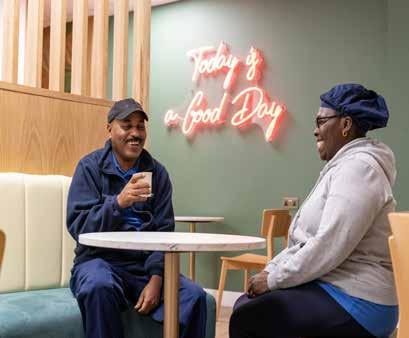
During the Covid-19 pandemic, we undertook the challenge of raising £1.25 million to support staff wellbeing across our hospitals as part of our Covid Relief Project.
One important element of this work was a commitment to updating staff spaces such as breakrooms and lounges, shower rooms, changing facilities and toilets.
The final piece of the project came to a close this year when we were proud to open the Flagship Staff Lounge on the ground floor of the Queen Elizabeth Queen Mother building at St Mary’s Hospital, joining newlyrenovated spaces at charing Cross and Hammersmith Hospitals.
In this warm, welcoming environment, Trust staff are encouraged to take breaks, rest and refuel. It provides a dedicated space where members of staff can grab a coffee, meet with colleagues or just catch up on life admin.
Additional facilities include pods for private calls or conversations as well as mobile-device battery charging stations. There is 24/7 swipe access to each lounge with a Trust ID badge.
Through our research fellowships programme, health professionals across our hospitals are taking their first steps into academic careers after receiving one of our grants this year.
In 2023/24 we awarded six fellowships - funded jointly with the NIHR Imperial Biomedical Research Centre - enabling staff to take time out from their professional role and focus solely on research. Our fellows each received a grant of up to £85,000 to progress their project and learn valuable research skills.
Dr Laura Ellis recently completed her research project exploring whether chemical changes affecting how genes are expressed, called methylation, could be used to predict which pre-cancers might develop into cervical cancer. Laura hopes her research will be used to create a test for at risk patients.
“DNA methylation has the potential to be used on self-samples, which may help bring cervical screening to those who currently don’t attend, who have the worst risks of cervical cancer.” She said, "During the research fellowship I developed a deeper understanding and passion for academia, and it provided a stepping stone from working as a clinical doctor to pursuing full-time research.”
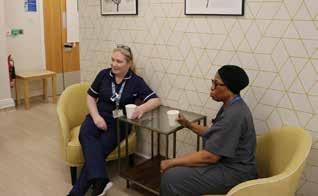
75% of research fellowships awarded in the last six years have helped to support women in research.
ABOVE: Dr Laura Ellis, Research Fellow
“The research fellowship provided a stepping stone from working as a clinical doctor to the pursuit of fulltime research.”
Dr Laura Ellis
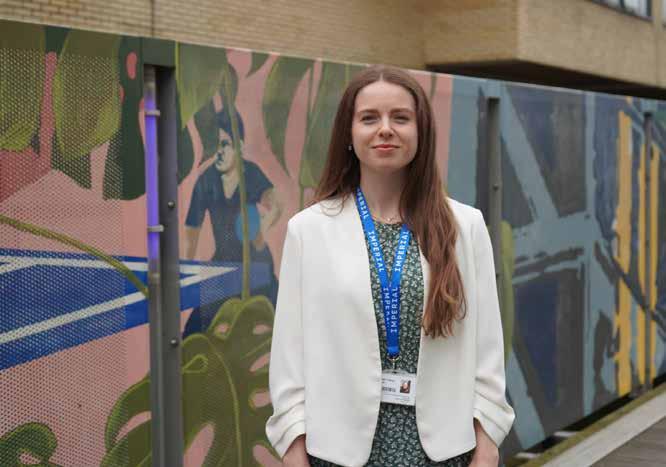
We understand that patient care is no longer confined to the hospital walls. That's why we are working in partnership with Imperial College Healthcare NHS Trust to identify ways in which we can make a significant positive impact by seeking to address some of the wider inequalities that affect people's health outcomes.
As we expand our work beyond the hospitals for the first time, we are adopting a test-andlearn approach, enabling us to explore how we can deliver programmes and services effectively in community healthcare settings.
Over the last year we have taken further steps in this journey, working closely with our NHS colleagues and other stakeholders to plan and develop these new programmes.
During the year we focused on developing three main areas of activity:
• A new community funding scheme that will help us address health inequalities affecting some of the most vulnerable people in north west London
• An employability programme, enabling us to help people living in our local communities to gain valuable workplace skills and confidence through volunteering
• Expanding our arts and creative activity programme beyond the hospital walls to provide support in community settings.
During 2023/24 we collaborated with the pain management team at Charing Cross Hospital and the north west London community to improve support for people living with chronic pain.
We co-designed a sevenweek course, called ‘Changing Perspectives,’ with artist Jon Rees, to help people explore their experience of pain through photography.
Each week the group was given a theme to capture in photos, using these as a starting point for conversations in each session. These included identity, emotions, memories, relationships, loss and change, narratives and gratitude.
One participant, Natasha, described how the group provided a safe space for her to open up about her pain.
“In every session I felt heard, validated and valued,” she said. “It made me feel a lot less alone living with chronic pain and being able to share personal and vulnerable parts of my life in a safe and supportive environment with others who understand.”

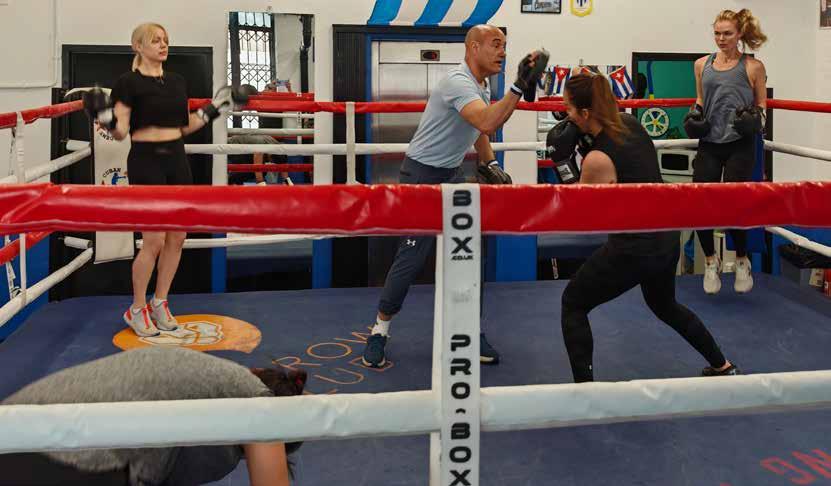
Over the last year, we have been reaching beyond our hospital walls to improve the health and wellbeing of people in our north west London community waiting for, or struggling to access healthcare services.
Through our Compassionate Communities programme, this year we awarded over £234,000 to nine organisations supporting local people.
One of these projects, ‘Box Outside the Box’, by Cuban Boxing Academy, offered physical and social activities on Saturday mornings such as boxercise, yoga, and chess to people living near White City struggling with their mental and physical health.
Marcos Camejo, Director and Founder of Cuban Boxing Academy, said: “The grant helped us provide a weekly service for isolated and vulnerable people in the local community.”
Marcos decided to set up the Cuban Boxing Academy after moving to the UK and has worked with Boxing England to train their youth squads. By funding the ‘Box Outside the Box’ project we have supported the expansion of the programme to provide high-quality, accessible, and low-cost sessions.
Other projects supported by Compassionate Communities in 2023/24 included dance classes for dementia patients, a women’s peer-support group, drop-in sessions to help Somali residents access healthcare, and a gardening project to help Southall residents learn about growing healthy food.
67% of grants were to peer support and community groups.
“As well as the focus on one-toone support and training, the social setting, with peer support and encouragement, helps to ensure participants aren’t alone and isolated but are part of a community with similar challenges and obstacles sharing an opportunity to move forward and overcome them.”
Marcos Camejo Director & Founder of Cuban Boxing Academy
We have had considerable success in delivering against the aims and ambitions of our long-term strategy 2022-2025, and by extending it to 2026 we give ourselves a valuable opportunity to build upon our achievements to date, and lay the foundations for yet more improvements in the years to come.
Extending our current strategy to 2026 will enable us to continue working closely alongside Imperial College Healthcare NHS Trust to support better health outcomes - not only for patients within the hospital walls but also for people living in the surrounding communities of north west London.
As we enter the next year of our strategy, we will not only continue to deliver our core grants, arts and volunteering programmes as normal, but will also expand on activities we introduced over the last year, as well as introducing new programmes of work. These include:
In 2024/25, The Charing Cross pilot will continue, taking forward learnings from the last year to improve and enhance the programme design. We will also be seeking to recruit more volunteers. Importantly, we will be taking the lessons learnt from the pilot at Charing Cross, and developing the volunteer ‘responder’ role at Hammersmith Hospital.
Demand for our Compassionate Communities fund continues to increase. A long-term review of the programme is underway; the researchers are both exploring the overall impact of the programme, and supporting grantholders to improve the evaluation of their projects. Following a detailed review this year, we expect to relaunch Innovate at Imperial in 25/26, to better support transformational ideas across our hospitals.
We will continue to develop the programme, working with the Trust to get more local people into quality jobs within the Trust. We will review the programme to explore how we add value to the experience for volunteers and improve their skills further.
Following further research and scoping work, we plan to increase our support for local communities in 2024-25 by expanding the programme to include building connections between the Trust and local refugee families living in hotels, as well as looking at how we can support cardiology patients through creative walking activities.
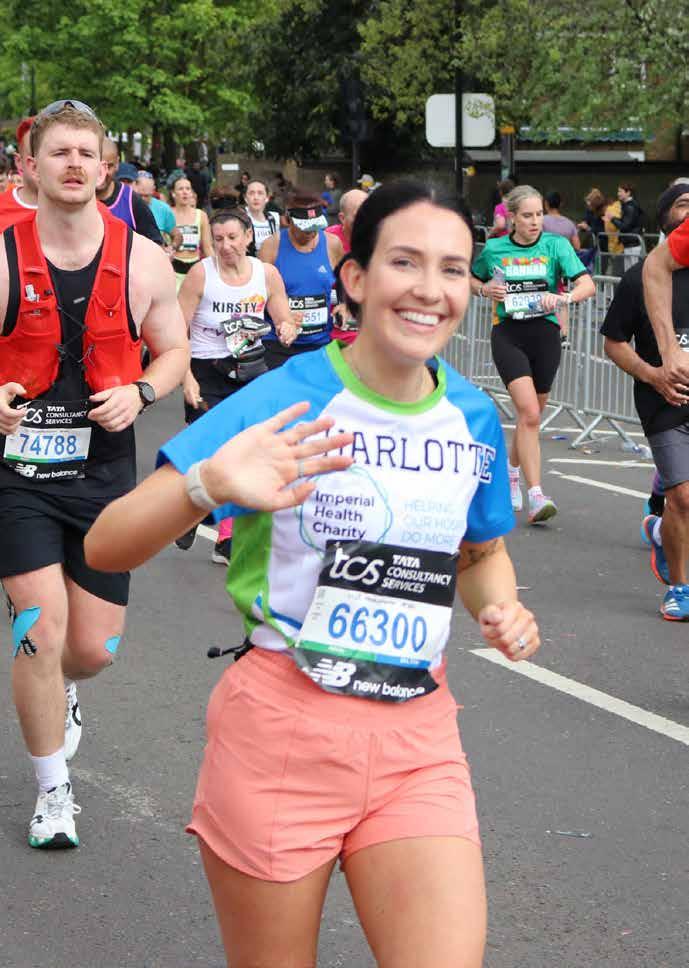

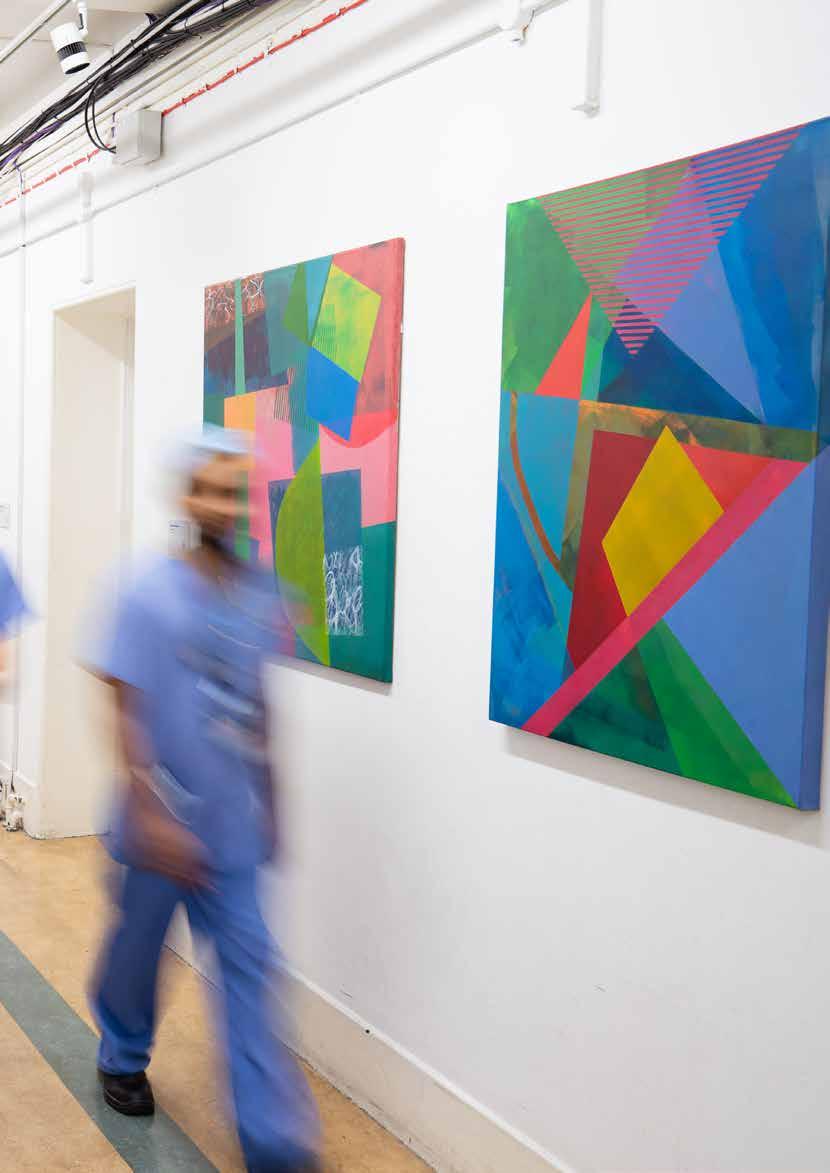
Good governance is essential to our continued success and enables us to manage our risks appropriately, cultivate a positive working environment and culture for our people, and deliver our charitable activities in compliance with all relevant legislation.
Imperial Health Charity is an independent charity and a charitable company limited by guarantee. It is registered with Companies House and with the Charity Commission for England and Wales. The charity was registered as a UK charity on 1 April 2016 (no. 1166084) and as a Charitable Company on 11 February 2016 (no. 9999900). The charity’s governing document is its Memorandum and Articles of Association.
The objects of Imperial Health Charity are restricted specifically to:
• any charitable purpose or purposes relating to the National Health Service or for the general or specific purposes of the Imperial College Healthcare NHS Trust; and
• the relief of sickness and preservation of health of people living in the UK for the public benefit.
Although we are independent of Imperial College Healthcare NHS Trust, our work focuses on enhancing and improving the quality of patient care beyond that which can be achieved by routine NHS funding and on health initiatives for the wider community.
Our work also includes focusing on opportunities to boost income through fundraising, enabling further support for our charitable activities within and beyond the Trust’s hospitals.
Our Board of Trustees is legally responsible for the governance, strategic planning and leadership of the charity. At the end of the year the board comprised 10 trustees: seven independent members and three representing Imperial College Healthcare NHS Trust. Under the Memorandum and Articles of Association, the chair must be one of the independent members.
Trustees are appointed as company directors for a renewable term of three years and can serve no more than three consecutive terms.
We provide public benefit by helping to improve the quality of care and hospital experience for patients at the five hospitals of Imperial College Healthcare NHS Trust and in the wider community of north west London. In reviewing our aims and objectives and planning future activities, our trustees have taken into account the Charity Commission’s general guidance on public benefit and always ensure that our activities are in line with our charitable purpose and objects.

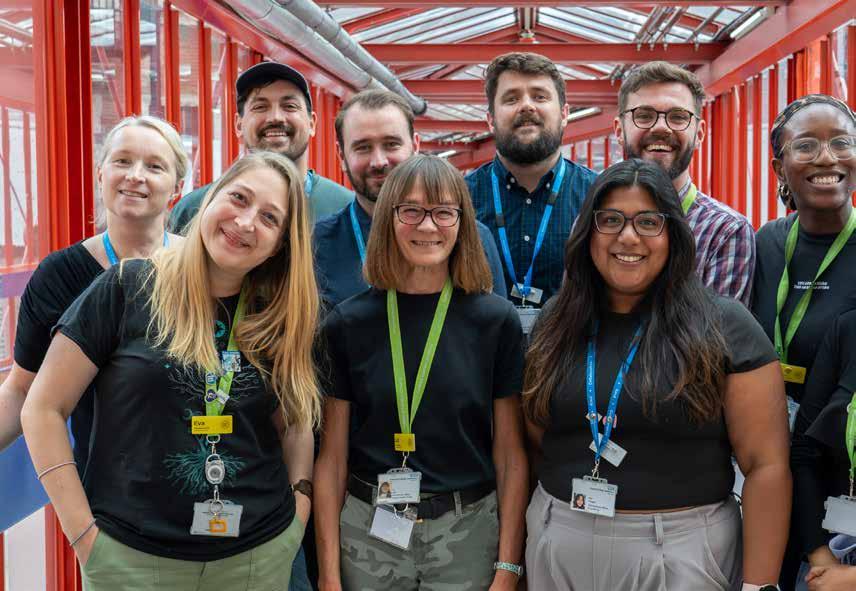
Vacancies for independent trustees are advertised in the charity sector and health sector media, on our website and within the Trust’s hospitals. We also work with carefully selected executive search agencies, whose brief emphasies the charity's aim to improve the diversity of its trustee board. Suitable candidates are interviewed by a selection panel and nominations to serve as representatives of the Trust are put forward for consideration by the board.

A formal induction programme is provided for new trustees, including an information pack containing our governing document, the most recent Annual Report & Accounts, budgets, policies and minutes. All trustees are invited to attend seminars and conferences on topics relevant to their roles during their term of office.
Each trustee undertakes an individual appraisal with the chair as part of the wider board review. The objective of the appraisal process is to review each trustee’s individual contribution as well as the performance of the board as a whole.
its obligations:
• Arts Committee (oversees arts strategy and activities)
Audit & Risk Management Committee (oversees annual audit and risk management)
Development Committee (oversees, supports and drives income generation through fundraising)
Finance & Investments Committee (oversees financial strategy and investments)
Grants Oversight Committee (oversees main grant-making activities and reviews major grant applications)
Research Fellowships Committee (oversees the review and award of the annual research fellowship grants)
The board appoints a chief executive who is responsible for the implementation of the board’s strategy and day-to-day running of the charity’s activities, policies and procedures.
The Grants Oversight Committee and Research Fellowships Committee are responsible for the majority of our grant-making activities. This involves implementing grant-making strategies and reviewing significant grant applications. Some smaller grant applications may be considered and approved by the Chief Executive and/or Head of Grants where appropriate.
Further expenditure is managed by selected members of staff at Imperial College Healthcare NHS Trust – known as fund advisers – under delegated authority from the trustees. For more information about special purpose funds, please turn to p17.
The members of the Trustee Board from 1 April 2023 to the date of approval of these accounts are as below:
Independent
Kevin Bone (resigned 31 March 2024)
David Crundwell, Chair (resigned 15 July 2024)
Dr Anita Donley OBE
Christiane Elsenbach (appointed 4 March 2024)
Babs Evans
Dr Sandra Husbands
Caroline Lien, Deputy Chair (resigned 13 February 2024)
Tingting Peng
Dr Andreas Raffel, Chair (appointed 15 July 2024)
Representing Imperial College Healthcare NHS Trust
Bob Alexander (Non-Executive Director) (appointed 19 February 2024)
Michelle Dixon (Director of Communications)
Prof Julian Redhead (Medical Director)
Nick Ross CBE (Non-Executive Director) (resigned 19 February 2024)
The senior management team is responsible for the day-to-day leadership of the charity, the management of our staff and volunteers, the delivery of our strategy and adherence to our policies and procedures.
The members of the senior management team from 1 April 2023 are as below:
Carolyn Bennett, Head of Grants (appointed 3 June 2024)
Charlie Breslin, Head of Communications (appointed 22 July 2024)
Jack Dixon, Head of Communications (resigned 19 April 2024)
Francesca Ferro, Head of Grants (resigned 22 December 2023)
Graeme Hood, Director of Finance & Resources (appointed 4 March 2024)
Andrew Kaponi, Director of Finance (resigned 8 January 2024)
Ian Lush OBE, Chief Executive
Chris Neal, Head of Volunteering
Hayley Pannick, Director of Development

Our approach to remuneration is led by reward principles in paying to attract and retain staff who can deliver effectively in a positive working environment. We take into account external benchmarking of the charity sector and industry as a whole, as well as our overall financial performance, and reference CPI and reward trends. The Board of Trustees considers the remuneration on an annual basis.
We work with external consultants to monitor and maintain our pay and grading structure, and ensure this remains based on principles of fairness, transparency and affordability, while maintaining budgetary control. Pay and grading comprises an eight-band pay structure - each band with a pay range covering five levels. Progression through the bands is determined by length of service.
Bank
National Westminster Bank First Floor, Natwest Bank PO Box 2A 69 Baker Street London, W1U 6AT
Investment UBS AG Wealth Management 5 Broadgate London, EC2M 2AN
Auditors
Moore Kingston Smith LLP 6th Floor 9 Appold Street London
EC2A 2AP
Policies
Our fundraising pledge
The trust and confidence of our supporters is very important to us. It is only thanks to their generosity that we can continue to help our hospitals do more and we value each and every contribution to our fundraising efforts. To each of our supporters, we pledge the following. We will:
follow all recognised codes of fundraising practice and other guidelines that prescribe best practice fundraising standards for the UK charity sector (we are registered with the Fundraising Regulator and comply with all UK charity laws and regulations)
ensure the way in which we communicate with our supporters is considerate and reasonable
• never sell our supporters’ personal information or share them with another organisation
• be transparent in making clear how our supporters’ money is spent through our website, newsletters and in our publicly available audited accounts
• acknowledge and thank supporters for their donations as a sign of our appreciation
• respond to any complaints in a timely and respectful fashion
• take special care in our contact with supporters who may be vulnerable.
During the year, all of our fundraising was carried out by staff employed directly by the charity. We did not contact third parties to fundraise on our behalf.
There were no compliance issues with the standards set out by the Fundraising Regulator, and we have provided appropriate guidance to supporters who wish to fundraise on our behalf. During the year we received two complaints related to our fundraising activities.
We believe that nobody – either our people or the people we support –should ever experience abuse of any kind, regardless of age, disability, gender, race, religious belief, sexual orientation or identity. This includes but is not limited to neglect, physical, sexual and emotional abuse. We communicate these principles to our trustees, staff, trustees, volunteers, contractors and partner organisations by issuing a pocketsized code of behaviour document, which
includes a list of behaviours that we expect them to follow. The card also includes advice on safeguarding. Staff and volunteers are expected to carry their ‘green card’ with them at all times. Our people are encouraged to report any concerns relating to breaches of the code and/or the safety and welfare of people with whom they come into contact when representing us.
We are committed to promoting equality of opportunity for all our staff and those who apply to join our team. We aim to create a working environment in which everyone is able to make best use of their skills, free from discrimination or harassment, and in which all decisions are based on merit.
We don’t discriminate against staff or job applicants on the basis of age, disability, gender reassignment, marital or civil partner status, pregnancy or maternity, race, colour, nationality, ethnic or national origin, religion or belief, sex or sexual orientation. The principles of non-discrimination and equality of opportunity also apply to the way in which staff treat visitors, clients, customers, suppliers, former staff members and the public.
We are committed to valuing the contribution of a diverse workforce and providing outstanding services to meet the needs of stakeholders and individuals in line with our equal opportunities policy. We provide support to members of staff through learning and development opportunities so that they can participate fully in the workforce. Our staff are also given appropriate access to training to enable them to progress within the organisation, and all promotion decisions are made on the basis of merit.
In order to help us create a culture of inclusion, we have participated in a programme of work to provide additional equality, diversity and inclusion training for our senior management team and all line managers, with all other staff given the opportunity to participate.
We have also established an internal Safe Support Network, providing an opportunity
for staff with one or more protected characteristics to share their experiences and contribute ideas to related initiatives. We also use specialised software to reduce the impact of unconscious bias during recruitment.
We know the climate crisis is not only an ecological emergency - it's a health emergency. As well as the increased likelihood of disastrous extreme weather events, global warming heightens the risk of infectious diseases and heatwaves, deepens health inequalities and compromises the resilience of health systems to maintain effective care.
We are actively considering how we can enhance Imperial College Healthcare NHS Trust's efforts to identify and implement more sustainable ways of working across its hospitals, as well as taking steps to limit the environmental impact of our own operations and activities. Having carried out a professional eco-audit in 2022/23, we have gained a comprehensive understanding of the factors within our organisation that contribute to our carbon footprint and the types of changes we could introduce to reduce the impact our work has on the environment.
Through the eco-audit process, collaboration with our NHS colleagues and further discussions with senior managers and staff, we have identified several action areas. Across these action areas, we believe we can introduce changes that will:
help us make a meaningful and immediate impact in reducing our organisational carbon footprint by implementing new and different ways of working
• create a 'think green' culture within the organisation, where our staff proactively consider the environment when making day-to-day decisions
• strengthen efforts to curb the Trust's environmental impact by supporting sustainability initiatives at our hospitals
• increase awareness of environmental issues and the implications for public health within our local communities.
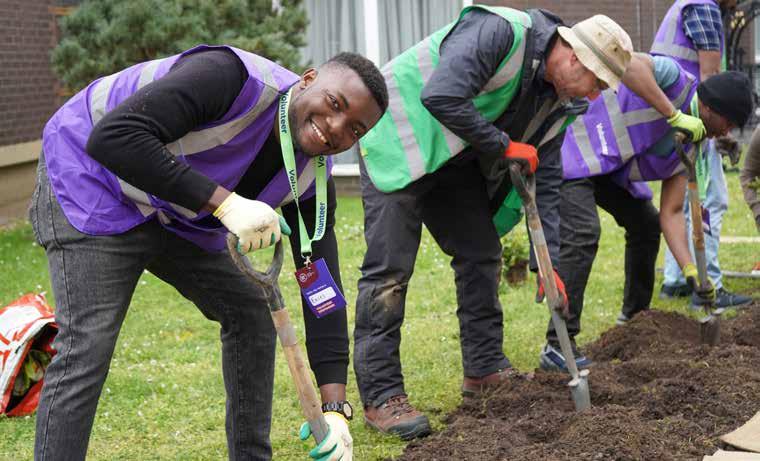
We are committed to the safeguarding and protection of children and adults at risk in our work and will do everything possible to ensure that only those who are suitable to work with these vulnerable groups are recruited to work for us. Mandatory safeguarding training is required of all our trustees, staff, volunteers and contractors, and we have designated members of staff as safeguarding lead and deputy lead. We also carry out safer recruitment practices when appointing staff and volunteers to roles.
We aim to develop an instantly recognisable community of volunteers who are visibly making a positive difference to the experience of patients, visitors and staff. We want volunteers to feel valued and well supported as part of the team and to truly live our values in their roles.
We want hospital staff to be able to work with and support volunteers to help them make a difference for patients. We believe the role of a volunteer within the NHS is to add value to the work of paid professionals, not to replace jobs, cover gaps or cut costs.
Our volunteering policy sets out our commitment to managing a high-quality volunteering programme and the methods through which we will do this, to ensure that
from the experience. The policy is available to read in full on our website.
We aim to create a workplace culture that promotes and supports the health and wellbeing of all our staff. This involves addressing and tackling factors that may have a negative impact on mental health, ensuring managers have the right skills to support staff, providing support and guidance for any staff member experiencing mental health issues and recognising that workplace stress is a health and safety issue.
Effective risk management is fundamental in enabling us to deliver our strategy and ensure the charity remains strong and sustainable in the long term. With the support of our committees and senior management team, the trustees consider significant strategic and operational risks on an ongoing basis. We have a robust process to help us identify and manage the principal risks we face, and the trustees are satisfied that appropriate systems and procedures are in place to mitigate and manage these risks.
At the February 2024 meeting of the Trustee Board it was agreed to replace the Finance & Audit Committee with two separate committees – a Finance & Investments Committee and an Audit & Risk Management Committee. Terms of reference for each committee have now been agreed and the new structure will operate from the start of the 2024/25 year.
Our principle risks and their key mitigations are:
• Strategy delivery
We set ourselves an ambitious strategy for 2022-25. Failure to deliver the activities outlined in the strategy or adequately evidence its impact would present a significant risk. We have adopted a flexible approach to reviewing our strategic progress, which will enable us to assess internal and external risks as they arise, and subsequently identify any adaptations to the strategy that may be required. Internal monitoring, evaluation and reporting will help us stay on course to achieve stated targets, and we have implemented a new digital system for recording and evaluating key impact data.
Financial
• Financial performance
In order to continue our charitable activities, we are reliant on our two main sources of income: investment returns and fundraised income (including legacies). Failure to meet our targets for either or both of these presents a significant risk to our ability to deliver our programmes and honour our grant
commitments.
Ongoing instability in the economy and investment market will have a significant impact on our investment capital value and investment income. We have acted quickly to benefit from higher interest rates and remain in regular dialogue with our investment managers.
We are also reviewing our relationship with our investment managers with the intention to move towards more ethical investments that support our charitable mission. We anticipate being able to absorb adverse investment market movements through a combination of healthy general reserves and astute financial stewardship. The establishment of the Finance & Investments Committee will further strengthen our ability to respond to external factors affecting investment performance.
The impact of the cost of living crisis on household budgets is likely to lead to a further decline in individual giving during the year ahead, which will create an even more competitive market to secure funds from grant-makers, philanthropists and corporate supporters. Our income from community and events fundraising is also likely to continue to be affected during the year, so we have developed plans to generate additional income, including enhancing our promotional activities within the hospitals.
• Reputational risks
Given the nature of our work, reputational risks may arise from our fundraising and grant-making activities, or our arts and volunteering programmes. Plans are in place to mitigate these risks as far as reasonably possible.
To avoid inappropriate or unethical use of charitable funds, all grant applications are scrutinised for ethical issues. In certain circumstances, charitable funds are disseminated in accordance with a donor’s specific wishes, within reason, or the stated aims of a particular campaign or fund.
We are registered with the Fundraising Regulator and adhere to its code of conduct. We also have our own ethical fundraising
policy and do not use external agencies for any of our fundraising activities. The trustees have oversight of charitable spending and scrutinise grant awards. Additional responsibility is delegated to the Grants Oversight Committee.
The artworks we acquire and commission are approved by members of NHS staff and external experts through our Arts Committee.
Our IT support is outsourced to a national provider, which is ISO27001 accredited, and our cloud-based databases are stored off-site by a software provider, which is also ISO27001 accredited. In accordance with the Data Protection Act 2018, our privacy statement sets out how we collect and use personal information. Our staff receive appropriate training and information regarding data protection procedures on an ongoing basis and all reasonable steps are taken to protect the security of personal information.
During 2024/25 The new Director of Finance & Resources will be conducting a review of systems and processes across the charity, as well as updating policies where appropriate. The creation of the new Audit & Risk Management committee, which has a remit to review the charity’s approach to all aspects of internal control, will further strengthen our ability to respond to any potential future breach.
• Delegation of authority to fund advisers
Responsibility for the day-to-day management of certain funds is delegated to designated fund advisers, meaning that decisions regarding a proportion of our funds are managed by NHS staff outside our direct control. Only senior members of NHS staff with an appropriate level of responsibility in a relevant service are approved as fund advisers and all expenditure is checked against the stated purposes of the relevant fund before awards are approved.
Goods and services are usually procured through the hospitals' procurement system to ensure value for money and compliance with relevant policies. We also update our special purpose fund governance document on an annual basis.
Our Safeguarding Policy was updated in January 2024 and has been accredited by the plain English campaign for its use of language. It sets out our commitment to the protection of adults and children who may be at risk in our work. We also have processes and procedures in place that enable us to put our policy into practice. This includes our Code of Behaviour card (also accredited by the plain English campaign), which is issued to all staff and volunteers when they start, and additional training where this is relevant to an individual's role.
risks to staff and volunteers
The realities of working in a hospital environment mean that there is always the potential of being exposed to a patient or member of the public who is infectious or confrontational, or of being exposed to a potentially traumatic incident. Charity staff always carry out a risk assessment for any new environment before allowing staff or volunteers to work there, and all staff and volunteers are given training in completing personal risk assessments. All risk assessments are renewed at least once a year. We also provide additional mental health and wellbeing support for our staff.
Due to the location of our premises in central London and following a number of terror-related incidents in recent years, we continue to recognise the enhanced risk this poses to the safety and wellbeing of our staff and volunteers, as well as our ability to maintain business operations during a period of significant and unexpected disruption. During the year we reviewed and strengthened our existing policies and procedures in light of this threat and continue to provide comprehensive guidance for staff to follow in the event of a terror related incident, cyber-attack or significant disruption to travel infrastructure in the local area. We also recognise the alarming and distressing nature of such incidents and provide appropriate emotional wellbeing support to our staff and volunteers as required.
The trustees are responsible for preparing the Report of the Trustees and the financial statements in accordance with applicable law and United Kingdom Accounting Standards (United Kingdom Generally Accepted Accounting Practice).
Company law requires the trustees to prepare financial statements for each financial period that give a true and fair view of the state of affairs of the charitable company and of the incoming resources and application of resources, including the income and expenditure of the charitable company for that period.
In preparing those financial statements, the trustees are required to:
• select suitable accounting policies and then apply them consistently
• comply with applicable accounting standards, including FRS 102, subject to any material departures disclosed and explained in the financial statements
• state whether a Statement of Recommended Practice (SORP) applies and has been followed, subject to any material departures which are explained in the financial statements
• make judgements and estimates that are reasonable and prudent
• prepare the financial statements on a going concern basis unless it is inappropriate to presume that the charitable company will continue in business.
The trustees are responsible for keeping proper accounting records, which disclose with reasonable accuracy at any time the financial position of the charitable company and to enable them to ensure that the financial statements comply with the Companies Act 2006.
They are also responsible for safeguarding the assets of the charitable company and hence for taking reasonable steps for the prevention and detection of fraud and other irregularities.
In so far as the trustees are aware:
• there is no relevant audit information of which the charitable company’s auditor is unaware
• the trustees have taken all the steps that they ought to have taken to make themselves aware of any relevant audit information and to establish that the auditor is aware of that information.
The Trustees’ Annual Report is approved by the trustees of the charity.
The charity saw a change in Chair of the Board of Trustees from David Crundwell to Dr Andreas Raffel on 15/07/2024
Approved by the trustees on 25 November 2024 and signed on their behalf by:

Dr Andreas Raffel Chair of Trustees
Moore Kingston Smith LLP were re-appointed as auditors in the year in accordance with the Companies Act 2006.
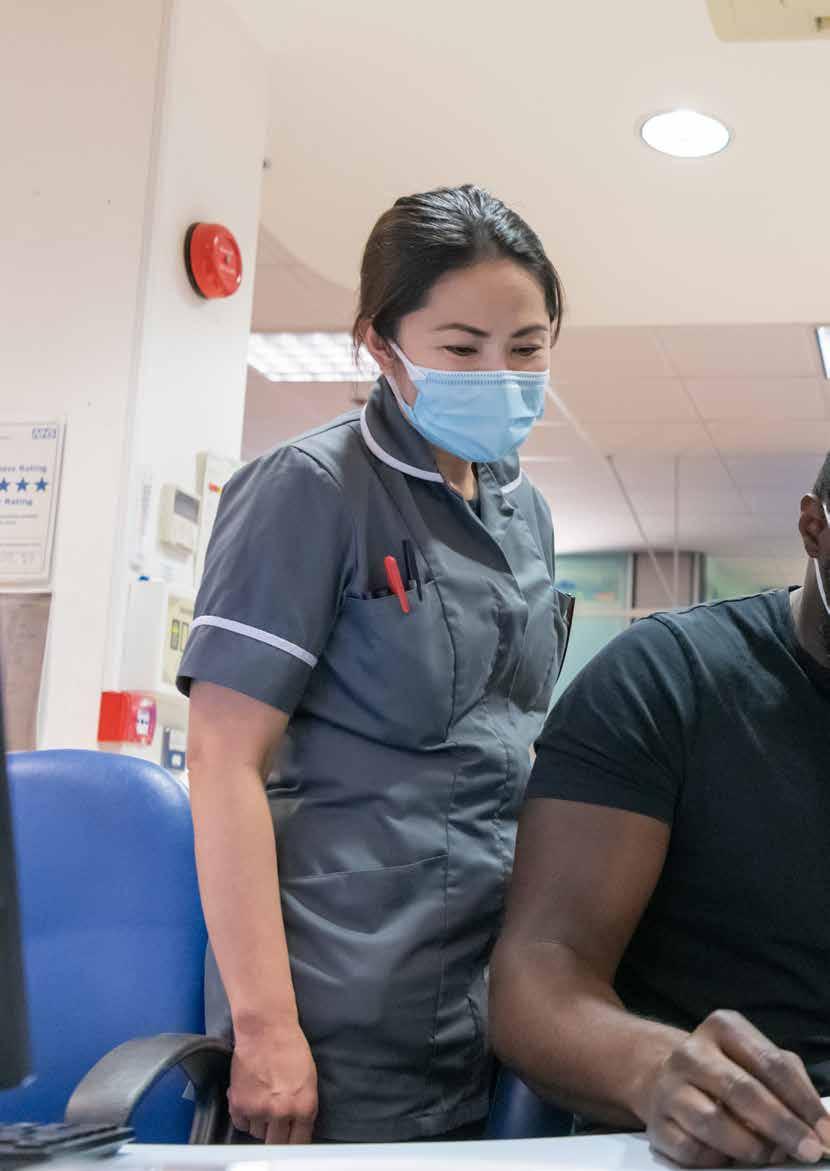

Thanks to the generosity of our supporters and the ongoing efforts of our staff and volunteers, the charity performed better financially than we had budgeted for in the year in terms of income generation and expenditure levels.
The charity recorded a planned operating deficit as it spent down an element of reserves in keeping with the objectives as set out in the strategic plan, though the strong performance in terms of income generation means that the deficit was lower than expected. Unrealised Investment gains recorded during the year mean that reserves are significantly up year-on-year.
A summary of these results is presented in further detail in the table below:
Charitable Activity
Arts (776) 4% (746)
Volunteers (962) 30% (740)
Operating Deficit (1,390) (57%) (3,262)
During the year the charity generated income totalling £7.2m and spent £8.6m helping our hospitals do more through our grant-making, arts and volunteering activities.
Owing to a gain on investments during the year, added to a gain on the revaluation of our property investments and our collection of art works, the net movement in funds for the year is £10.0m. This is set out in further detail in this table:
Income
Expenditure
Investment gain / (loss)
Property revaluation
Revaluation of art collection
£7.2m £5.7m
(£8.6m) (£9.0m)
£6.7m (£2.3m)
£3.7m -
£1.0mNet movement in funds
Funds brought forward
Reserves at 31 March
£10.0m (£5.6m)
£86.8m £92.4m
£95.8m £86.8m
We are reliant on voluntary contributions from our supporters as our principal source of income and without these generous donations we would not be able to sustain our charitable activities. We are therefore extremely grateful to everyone who has generously contributed to support our work during the year.
In 2022/23 we successfully raised over £4m. In 2023/24 we raised in excess of £5.4m, including just over £2m from legacies. Investment income has remained steady yearto-year at £1.72m, compared to £1.67m for the previous year.
The primary focus of our charitable expenditure remains the award of grants to support healthcare projects for the benefit of patients and NHS staff at Imperial College Healthcare NHS Trust and the wider population of north west London. The total value of grant awards decreased during 2023/24, largely due to a decrease in the level of Fund Advisor led activity. Expenditure on our arts and volunteer programmes both increased slightly year on year.
The balance sheet net assets have increased by 11.5% during the year due to the increase in investment portfolio value from £68.9m to £73.2m. Revaluation of the charity’s property investments and art collection added a further £4.7m. The gain was partially offset by a planned operational loss of £1.39m.
• Investments comprising the portfolio held with UBS and property owned have increased in value from £88.6m to £96.6m due to the growth in value in our portfolio and the increased valuation of our property at Winsland Street.
• Current assets have dropped in value by £500k due to cash reserves being used to pay out grants to our beneficiaries.
• Creditors have reduced by £1.45m to £7.75m due to a reduction in new grant commitments and the timing of payments for existing commitments.
• Free reserves are unchanged at £31m. Free reserves are defined as unrestricted general funds excluding art and property assets and which may be used for any purpose defined by the charity.
Our investment portfolio has a long-term total return target of CPI +4.5%. There is no separate income target. The trustees rely on specialist advice for fund selection and allocation.
The performance of our investment managers and portfolio is monitored by the Finance & Investment Committee, a sub-committee of the Board of Trustees. We take care to ensure the investment portfolio is not exposed to investments that may be inconsistent with our mission and objectives. To this end, direct or indirect investment in the tobacco industry is not permitted. Overall, the portfolio performed strongly during the year. Investment values have increased by £4.3m in the year, standing at £73.2m (31 March 2023: £68.9m). This growth is net of £2.4m in drawdowns made to support the charity’s cash flow during the year. Investment income attributable to the portfolio grew slightly from £1.314m in 2023 to £1.337m in 2024.
Taking into account the income, the drawdowns and the retained capital growth, the total return for the year ended 31 March 2024 was 11.65%.
The trustees consider a key measure of sustainability to be the maintenance of the real value of the investment portfolio for future generations after disbursing 4.5% return. The strong performance of the portfolio this year means that the target has been met.
At the May 2024 meeting of the Trustee Board, Trustees approved a revised reserves policy which will likely lead to a reduction in free reserves over the next few years, though the target to preserve the real terms value for the endowment will remain.
We seek to spend our restricted funds proactively but we may hold onto them for a period of time so they can be allocated in line with the donor’s intentions. In the rare and unlikely event that funds cannot be used in line with the original restriction, we will contact the donor to discuss an alternative use of the funds.
The trustees consider a number of risk factors relevant to the charity that would indicate the need for us to maintain significant levels of reserves. These include:
• the limitations on reliability of voluntary income, and the potential requirement to fill any shortfall in budgeted income;
• our plans for steady strategic growth, which will require ongoing investment;
• funding commitments that have previously been made to the Trust, which we must be able to fulfil;
• the likelihood of continued demand for charitable support on the part of the Trust and its hospitals;
• the uncertain economic outlook as a result of global events.
As of 31 March 2024 the charity’s free reserves (consisting of general funds excluding fixed assets and property investments) stand at £31m. The charity is currently working to develop its new long-term strategic plan and a review of the reserves policy, including a plan for the appropriate use of free reserves will form an integral part of that process.
We have audited the financial statements of Imperial Health Charity (‘the company’) for the year ended 31 March 2024 which comprise the Statement of Financial Activities, the Balance Sheet, the Cash Flow Statement and notes to the financial statements, including significant accounting policies. The financial reporting framework that has been applied in their preparation is applicable law and United Kingdom Accounting Standards, including FRS 102 ‘The Financial Reporting Standard Applicable in the UK and Republic of Ireland’ (United Kingdom Generally Accepted Accounting Practice).
In our opinion the financial statements:
• give a true and fair view of the state of the charitable company’s affairs as at 31 March 2024 and of its incoming resources and application of resources, including its income and expenditure, for the year then ended;
• have been properly prepared in accordance with United Kingdom Generally Accepted Accounting Practice; and
• have been prepared in accordance with the requirements of the Companies Act 2006.
We conducted our audit in accordance with International Standards on Auditing (UK) (ISAs(UK)) and applicable law. Our responsibilities under those standards are further described in the Auditor’s Responsibilities for the audit of the financial statements section of our report. We are independent of the charitable company in accordance with the ethical requirements that are relevant to our audit of the financial statements in the UK, including the FRC’s Ethical Standard, and we have fulfilled our other ethical responsibilities in accordance with these requirements. We believe that the
audit evidence we have obtained is sufficient and appropriate to provide a basis for our opinion.
In auditing the financial statements, we have concluded that the trustees’ use of the going concern basis of accounting in the preparation of the financial statements is appropriate.
Based on the work we have performed, we have not identified any material uncertainties relating to events or conditions that, individually or collectively, may cast significant doubt on the charitable company's ability to continue as a going concern for a period of at least twelve months from when the financial statements are authorised for issue.
Our responsibilities and the responsibilities of the trustees with respect to going concern are described in the relevant sections of this report.
The other information comprises the information included in the annual report, other than the financial statements and our auditor’s report thereon. The trustees are responsible for the other information. Our opinion on the financial statements does not cover the other information and, except to the extent otherwise explicitly stated in our report, we do not express any form of assurance conclusion thereon.
In connection with our audit of the financial statements, our responsibility is to read the other information and, in doing so, consider whether the other information is materially inconsistent with the financial statements or our knowledge obtained in the audit or otherwise appears to be materially misstated. If we identify such material inconsistencies or apparent material misstatements, we are required to determine whether there is a material misstatement in the financial statements or a material misstatement of the other information. If, based on the work we have performed, we conclude that there is a material misstatement of this other information, we are required to report that fact.
We have nothing to report in this regard.
Opinions on other matters prescribed by the Companies Act 2006
In our opinion, based on the work undertaken in the course of the audit:
• the information given in the trustees’ annual report for the financial year for which the financial statements are prepared is consistent with the financial statements; and
• the trustees’ annual report has been prepared in accordance with applicable legal requirements.
Matters on which we are required to report by exception
In the light of the knowledge and understanding of the company and its environment obtained in the course of the audit, we have not identified material misstatements in the trustees’ annual report.
We have nothing to report in respect of the following matters where the Companies Act 2006 requires us to report to you if, in our opinion:
• adequate accounting records have not been kept, or returns adequate for our audit have not been received from branches not visited by us; or
• the financial statements are not in agreement with the accounting records and returns; or
• certain disclosures of trustees’ remuneration specified by law are not made; or we have not received all the information and explanations we require for our audit; or
• the trustees were not entitled to take advantage of the small companies exemption from preparing a Strategic Report.
As explained more fully in the trustees’ responsibilities statement set out on page 42, the trustees (who are also the directors of the charitable company for the purposes of company law) are responsible for the preparation of the financial statements and for being satisfied that they give a true and fair view, and for such internal control as the trustees determine is necessary to enable the
preparation of financial statements that are free from material misstatement, whether due to fraud or error.
In preparing the financial statements, the trustees are responsible for assessing the charitable company’s ability to continue as a going concern, disclosing, as applicable, matters related to going concern and using the going concern basis of accounting unless the trustees either intend to liquidate the charitable company or to cease operations, or have no realistic alternative but to do so.
Auditor's responsibilities for the audit of the financial statements
Our objectives are to obtain reasonable assurance about whether the financial statements as a whole are free from material misstatement, whether due to fraud or error, and to issue an auditor’s report that includes our opinion. Reasonable assurance is a high level of assurance, but is not a guarantee that an audit conducted in accordance with ISAs (UK) will always detect a material misstatement when it exists. Misstatements can arise from fraud or error and are considered material if, individually or in aggregate, they could reasonably be expected to influence the economic decisions of users taken on the basis of these financial statements.
As part of an audit in accordance with ISAs (UK) we exercise professional judgement and maintain professional scepticism throughout the audit. We also:
• Identify and assess the risks of material misstatement of the financial statements, whether due to fraud or error, design and perform audit procedures responsive to those risks, and obtain audit evidence that is sufficient and appropriate to provide a basis for our opinion. The risk of not detecting a material misstatement resulting from fraud is higher than for one resulting from error, as fraud may involve collusion, forgery, intentional omissions, misrepresentations, or the override of internal control.
• Obtain an understanding of internal control relevant to the audit in order to design audit procedures that are appropriate in the circumstances, but not for the purposes of expressing an opinion on the effectiveness of the charitable
company’s internal control.
• Evaluate the appropriateness of accounting policies used and the reasonableness of accounting estimates and related disclosures made by the trustees.
• Conclude on the appropriateness of the trustees’ use of the going concern basis of accounting and, based on the audit evidence obtained, whether a material uncertainty exists related to events or conditions that may cast significant doubt on the charitable company’s ability to continue as a going concern. If we conclude that a material uncertainty exists, we are required to draw attention in our auditor’s report to the related disclosures in the financial statements or, if such disclosures are inadequate, to modify our opinion. Our conclusions are based on the audit evidence obtained up to the date of our auditor’s report. However, future events or conditions may cause the charitable company to cease to continue as a going concern.
• Evaluate the overall presentation, structure and content of the financial statements, including the disclosures, and whether the financial statements represent the underlying transactions and events in a manner that achieves fair presentation.
We communicate with those charged with governance regarding, among other matters, the planned scope and timing of the audit and significant audit findings, including any significant deficiencies in internal control that we identify during our audit.
Explanation as to what extent the audit was considered capable of detecting irregularities, including fraud
Irregularities, including fraud, are instances of non-compliance with laws and regulations. We design procedures in line with our responsibilities, outlined above, to detect material misstatements in respect of irregularities, including fraud. The extent to which our procedures are capable of detecting irregularities, including fraud is detailed below.
The objectives of our audit in respect of fraud, are; to identify and assess the risks of material misstatement of the financial statements due to fraud; to obtain sufficient appropriate audit evidence regarding the assessed risks of
material misstatement due to fraud, through designing and implementing appropriate responses to those assessed risks; and to respond appropriately to instances of fraud or suspected fraud identified during the audit. However, the primary responsibility for the prevention and detection of fraud rests with both management and those charged with governance of the charitable company.
Our approach was as follows:
• We obtained an understanding of the legal and regulatory requirements applicable to the charitable company and considered that the most significant are the Companies Act 2006, the Charities Act 2011, the Charity SORP, and UK financial reporting standards as issued by the Financial Reporting Council.
We obtained an understanding of how the charitable company complies with these requirements by discussions with management and those charged with governance.
• We assessed the risk of material misstatement of the financial statements, including the risk of material misstatement due to fraud and how it might occur, by holding discussions with management and those charged with governance.
We inquired of management and those charged with governance as to any known instances of non-compliance or suspected non-compliance with laws and regulations.
• Based on this understanding, we designed specific appropriate audit procedures to identify instances of non-compliance with laws and regulations. This included making enquiries of management and those charged with governance and obtaining additional corroborative evidence as required.
There are inherent limitations in the audit procedures described above. We are less likely to become aware of instances of noncompliance with laws and regulations that are not closely related to events and transactions reflected in the financial statements. Also, the risk of not detecting a material misstatement due to fraud is higher than the risk of not detecting one resulting from error, as fraud may involve deliberate concealment by, for example, forgery or intentional misrepresentations, or through collusion.
This report is made solely to the charitable company's members, as a body, in accordance with Chapter 3 of Part 16 of the Companies Act 2006. Our audit work has been undertaken so that we might state to the company’s members those matters we are required to state to them in an auditor’s report and for no other purpose. To the fullest extent permitted by law, we do not accept or assume responsibility to any party other than the charitable company and charitable company's members as a body, for our audit work, for this report, or for the opinions we have formed.
Adam Fullerton (Senior Statutory Auditor) for and on behalf of Moore Kingston Smith LLP, Statutory Auditor
6th Floor, 9 Appold Street London, EC2A 2AP
Date: 25 November 2024
Company reg. number 9999900
Income from:
Voluntary sources:
Donations
Legacies
Other trading activities
Investments
Other
Total income
Expenditure
Raising funds
Charitable activities:
Grants
Fund Adviser
Total expenditure
Net gains/(losses) on investments
Net income/(expenditure)
Transfers between funds
Net
Reconciliation
Funds
92,455 86,844
Fixed assets
Tangible fixed assets
Investments
Total fixed assets
Current assets
Debtors
Cash investments
Cash at bank and in hand
Total current assets
Creditors: amounts due within one year
current assets / (liabilities)
Net assets
Total funds
Approved by the Board of Trustees on 25 November 2024

Dr Andreas Raffel Chair of Trustees
For the year ended 31 March 2024
Cash flows from operating activities: Net cash used in operating activities
Cash flows from investing activities: Dividends, interest and rents from investments
Movement in cash held as investments Purchase of tangible fixed assets
Net cash provided by investing activities
Net (decrease)/increase in cash and cash equivalents
Cash and cash equivalents at 1 April
Cash and cash equivalents at 31 March
Reconciliation of net cash flows from operating activities
Net (expenditure)/income
Proceeds from sale of investments Gains on property valuations (Gains) / Losses on art valuations Dividends, interest and rents from investments
Net cash used in operating activities The notes on pages 59-75 form part of these financial statements.
The charity has no net debt and accordingly no net debt note has been presented.
The principal accounting policies adopted in the preparation of the financial statements are summarised below and have been consistently applied throughout the year and to the preceding period.
The financial statements have been prepared in accordance with the Statement of Recommended Practice: Accounting and Reporting by Charities (SORP 2019), for charities preparing their accounts in accordance with the Financial Reporting Standard applicable in the UK and Republic of Ireland (FRS 102) effective 1 January 2019 and the Financial Reporting Standard applicable in the United Kingdom and Republic of Ireland (FRS 102), and the Companies Act 2006.
The financial statements are prepared in sterling, which is the functional currency of the charity. Monetary amounts in these financial statements are rounded to the nearest one thousand pounds, unless otherwise indicated.
The charity meets the definition of a public benefit entity as defined by FRS 102. Assets and liabilities are initially recognised at historical cost or transaction value unless otherwise stated in the relevant accounting policy note(s).
The trustees will continue to scrutinise financial plans supporting the strategic planning for 2024 and beyond. The trustees approved a budget for the year ending March 2025 which showed a deficit of £1.7m to be funded from reserves. This still maintains reserves
within the parameters of the agreed reserves policy.
At their meeting in May 2024, trustees agreed to revise the reserves policy, reducing the amount to be held as free reserves, and will use 2024/25 to develop plans to bring reserves down to the newly agreed level in a sustainable way.
During the year trustees will closely monitor progress against the plan and review monthly forecasts so that any concerns can be identified in good time. Given these measures, the management team’s forecasts for the next 12 months, and the liquidity of cash, the trustees consider it appropriate for the financial statements to be prepared on a going concern basis and have not identified any material uncertainties relating to this.
1.3.1
Income is recognised in the period in which Imperial Health Charity is entitled to receipt of that income, when the amount can be measured with reasonable accuracy and receipt is probable. Income received relating to future accounting periods is deferred and recognised as a creditor within the balance sheet.
Legacy income is recognised when entitlement to the legacy exists, the amount is measurable and receipt is probable. This is when the executors have informed the charity that a payment which can be measured reliably may be made following the agreement of the estate's accounts. A discount is applied where there is any uncertainty of any sales achieving its expected sale price.
Gift Aid is accounted for as income in the same period as the donation to which it relates.
1.3.2 Gifts in kind
Gifts in kind over £1,000 are recognised as both income and expenditure and are included in the statement of financial activities at its fair market value that would have been charged if purchased from the donor.
1.3.3 Income from trading activities
Income from fundraising events received in advance is recognised at the time of the event. Other fundraising income is recognised when it falls due.
1.3.4 Investment income
Investment income comprises dividends, rental income and interest receivable, and is recognised on an accruals basis.
Dividends are received from money invested by our investment managers UBS.
Rental income is made up of a finance lease with a shop and Metropolitan Thames Valley Housing for part of the Burlington Danes site. The future minimum lease payments with Metropolitan Thames Valley Housing have been accrued and a finance lease debtor has been recognised. The term of the lease is 125 years from date of issue. Upon expiration the land reverts back to the charity. Interest is receivable from shortterm, fixed rate deposits.
1.3.5 Volunteers
Imperial Health Charity benefits greatly from the involvement and enthusiastic support of its many volunteers. In accordance with FRS 102 and the Charities SORP, the economic contribution of general volunteers is not recognised in the accounts.
Expenditure is accounted for on an accruals basis and is classified in the following categories:
- cost of raising funds; and - charitable activities. Cost of raising funds includes expenditure incurred on fundraising activities. Charitable activities includes expenditure directly relating to the delivery of the services (including staff costs) provided by the charity.
Grants to fund Imperial College Healthcare NHS Trust or other wider community projects are recognised in the accounts at the date of commitment once approved by the trustees and communicated to the recipient. Unused grant monies are written back to reserves.
1.4.1 Allocation of support and governance costs
Support costs are those functions that assist the work of the charity but do not directly undertake charitable activities. Support costs include back office costs, finance, technology, communications, personnel, payroll and governance costs which support the charity's activities. These costs have been allocated between cost of raising funds and expenditure on charitable activities based on a mixture of direct cost allocation and staff time spent on each area of work.
Governance costs represent the costs of governance arrangements, including external audit, legal advice for trustees and costs associated with constitutional and statutory requirements.
1.5 Tangible fixed assets and depreciation
All assets costing more than £1,000 and with an expected useful life exceeding one year are capitalised. Depreciation
is calculated to write off the cost of all tangible fixed assets by equal instalments over their expected useful lives. The rates generally applicable are:
- leasehold improvements (the lesser of 10 years of the remaining life of the lease)
- computer and information communication technology (three years or 33% per annum)
- other equipment (5 years or 20% per annum).
The art collection is not depreciated, as the charity conserves the works throughout the year, negating any decrease in value through wear and tear.
A revaluation of the artwork was undertaken by Tim Ritchie & Associates in March 2024 and the result is fully reflected in these financial statements. These works were valued at market value based on a comparison of prices achieved at auction.
Additions to the collection during the year comprise purchases and donated works (gifts in kind). These are shown at purchase cost or equivalent purchase cost.
Payments in respect of operating leases are charged to the statement of financial activities on a straight line basis over the lease term.
Cash and cash equivalents include cash in hand, cash held in current accounts with UK bank is readily realisable short-term fixed interest investments managed on behalf of the charity by CCLA and UBS.
Trade and other debtors are recognised at the settlement amount due after any trade discount offered. Prepayments are valued at the amount prepaid, net of any discounts due.
Investments comprise money invested with investment managers and property owned by the charity. Investment fixed assets are shown at market value.
Property assets are not depreciated but are shown at market valuation. Our property at Winsland Street, which comprises the majority of the value of our portfolio was revalued as at 31 March 024 by Cushman & Wakefield, 43 -45 Portman Square, London W1H 6LY. The increase in value identified in their report is reflected in these financial statements.
Other investments are included in the balance sheet at market price.
Creditors and provisions are recognised where the charity has a present obligation resulting from a past event that will probably result in the transfer of funds to a third party and the amount due to settle the obligation can be measured or estimated reliably. Creditors and provisions are normally recognised at their settlement amount after allowing for any trade discounts due.
The charity only has financial assets and financial liabilities of a kind that qualify as basic financial instruments. Basic financial instruments are initially recognised at transaction value and subsequently
measured at their settlement value.
Contributions to employees' personal pension plans are charged to the statement of financial activities in the year in which they become payable. These costs have been allocated between cost of raising funds and expenditure on charitable activities based on staff time spent on each area of work in line with the underlying salary.
Termination payments are recognised as an expense in the statement of financial activities immediately.
The general fund comprises those monies which may be used towards meeting the charitable objectives of the charity at the discretion of the trustees.
Designated funds are monies set aside out of the general fund and designated for specific projects.
Restricted funds are monies raised for, and their use restricted to, a specific purpose, or donations subject to donor imposed conditions.
1.15 Significant management judgements and key sources of estimation and uncertainty
The preparation of the financial statements requires management to make judgements, estimates and assumptions that affect the application of
policies and reported amounts of assets and liabilities, income and expenses.
The estimates and associated assumptions are based on historical experience and various other factors that are believed to be reasonable under the circumstances, the results of which form the basis of making the judgements about carrying values of assets and liabilities that are not readily apparent from other sources. Actual results may differ from these estimates.
Estimates and underlying assumptions are reviewed on an ongoing basis. Revisions to accounting estimates are recognised in the period in which the estimate is revised and in any future periods affected.
The following judgements and estimates are considered by the trustees to have most significant effect on amounts recognised in the financial statements:
- Artwork as per note 5 is included at a valuation based on reports provided by third party valuers. The latest valuation was provided by Tim Ritchie & Associates in March 2024. Additions during the year have been included at cost which is deemed to also be their market value.
- The investment property at Winsland Street was the subject of a red book valuation by Cushman and Wakefield as at the Balance Sheet date.
Management do not consider there to be any other material judgements or estimation and uncertainty requiring disclosure other than judgement in relation to Going Concern, which is discussed at Note 1.2.
Donations
Donations from individuals
Grants receivable
Legacies
Total Corporate donations
Donations from individuals
Donations over £1,000
Small donations under £1,000
Donations from events
In memoriam
Total Gifts in kind
Corporate donations
Small donations under £1,000
Donations over £1,000 Total Trust
The
Total future minimum lease receipts under non-cancellable operating leases for each of the following periods.
Within 1 year After 1 year but before 5 years After 5 years
Gross expenditure for the year is stated after charging:
One trustee received £84 for reimbursed expenses related to attendance at a Board meeting (2023: £Nil). No trustees were remunerated or received any other benefits (2023: nil). The trustees meetings incurred nil expenses (2023: nil).
Operating lease rentals for 2024 include break fees associated with the early end of the lease on our premises at Edgware Road.
During the period no termination payments in respect of redundancies were made (2023: nil).
The number of employees who earned more than £60,000 during the year was as follows:
£60,000 - £69,999
£70,000 - £79,999
- £99,999
£130,000 - £139,999
Key management personnel comprise Chief Executive, Director of Finance & Resources (previously Finance Director) and Director of Development.
Key management personnel
Value bfwd at 1 April:
At the beginning of the year Additions at cost
Revaluations in the year
Value cfwd at 31 March Depreciation and impairments:
Listed overseas investments
Private equity
Cash held
Total UBS portfolio
Investment properties
Total investments
Investments at market value
The charity's investment property at Winsland Street was revalued as at the Balance Sheet date by Cushman and Wakefield, which resulted in an unrealised gain of £3.7m being recognised in these accounts.
Note: £14k (2023: £Nil) of the trade debtors for 2024 were aged more than 1 year at the Balance Sheet date. £62,500 (2023: £Nil) of the other debtors was also aged more than 1 year at the Balance Sheet date.
8. Creditors: amounts falling due in less than one year
Analysis of accruals
9. Operating lease commitments
As at the 31 March the ageing of total minimum lease payments was as follows:
between 1 and 5 years Payable after more than 5 years
In March 2024 the charity exercised the break clause on its offices at Edgware Road, ending the lease commitment. It has since moved to new premises at Paddington Basin under a licence agreement.
10. Movement in cash and net debt
11. Analysis of net assets between funds
Note
a The Dresden Fund is an endowment and restricted fund for the benefit of patient hardship at the Trust.
b This is a permanent endowment, with which the charity can utilise the investment return for the purpose of charitable activities.
c This is a permanent endowment, with which the charity can utilise the investment return for the purpose of training nurses.
d The expendable endowment's can be used for the purpose of charitable activities.
e This is a restricted fund for the purpose of training nurses.
f Funds managed directly by Trustees for charitable activities.
g Funds managed directly by NHS Trust Staff under delegated authority by Trustees for charitable activities.
h Appeal fund designated to charitable activities within Children’s Services.
i General funds held for the general activities of the charity.
j. This is a restricted fund supporting the redevelopment of the Learning & Resource Centre in the Mint Wing at St Mary’s Hospital and stem cell research associated with spinal injuries.
Transfers between funds represent endowment income being transferred to funds where they can be used for general activities. Other transfers relate to grants that were awarded by the charity being written back as they have not been used.
Note
a The Dresden Fund is an endowment and restricted fund for the the benefit of patient hardship at the Trust.
b This is a permanent endowment, with which the charity can utilise the investment return for the purpose of charitable activities.
c This is a permanent endowment, with which the charity can utilise the investment return for the purpose of training nurses.
d The expendable endowments can be used for the purpose of charitable activities.
e Specific fund that received income for St Mary's Hospital 150th anniversary and restricted for projects at St Mary's.
f Funds managed directly by trustees for charitable activities.
g Funds managed directly by NHS Trust staff under delegated authority by trustees for charitable activities.
h Appeal fund designated to charitable activities within Children’s Services
i General funds held for the general activities of the charity.
Transfers between funds represent endowment income being transferred to funds where they can be used for general activities. Other transfers relate to grants that were awarded by the charity being written back as they have not been used.



Data sources
p7: Imperial College Healthcare NHS Trust Annual Report 2023/2024
p8: Imperial Health Charity, Big Charity Survey 2024
p9: Imperial Health Charity, post-event surveys, median score
p21: Employability Volunteering Programme survey, cohort 2, active Jan-Mar 2024
p25: Imperial Health Charity, St Mary's Children's Fund Survey 2024
